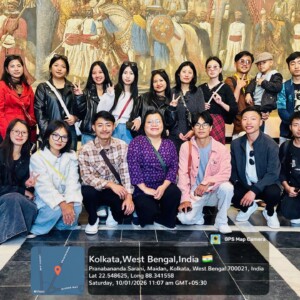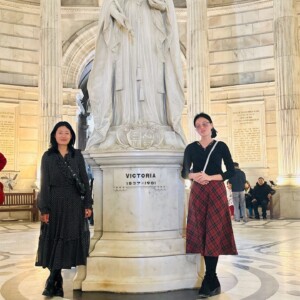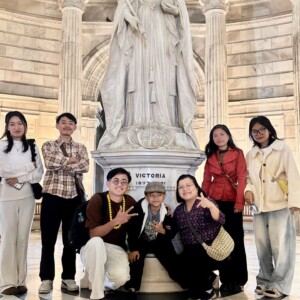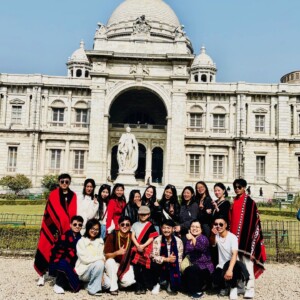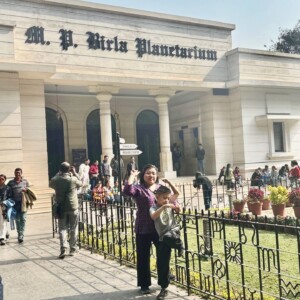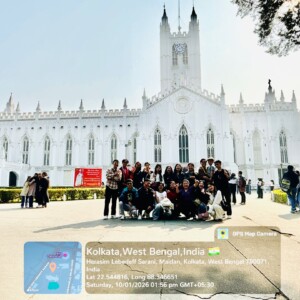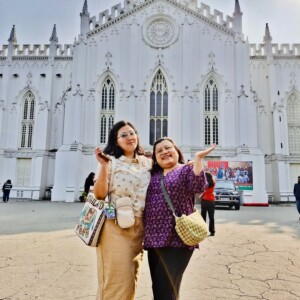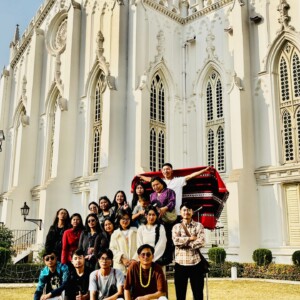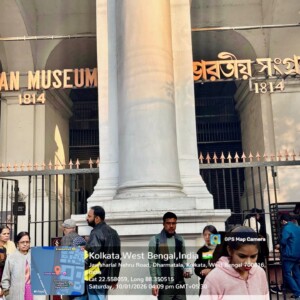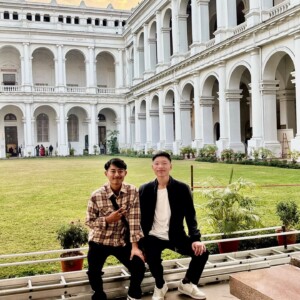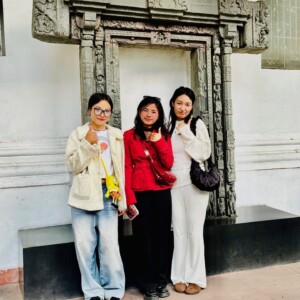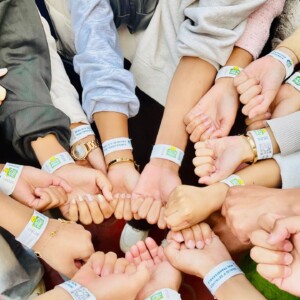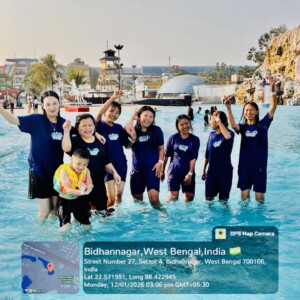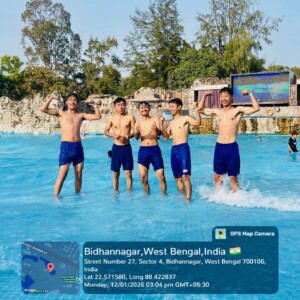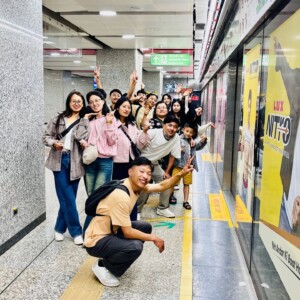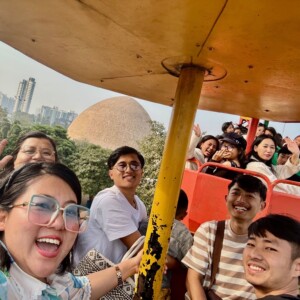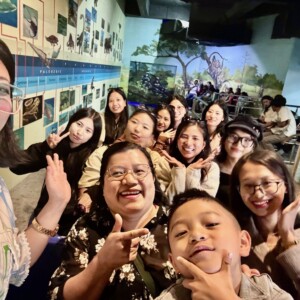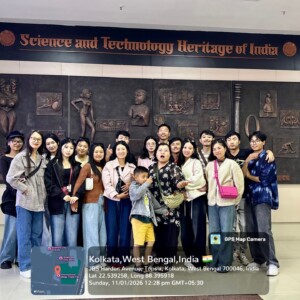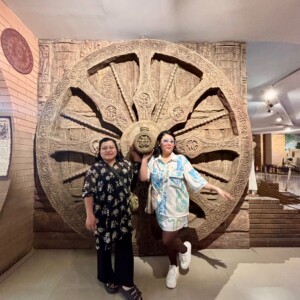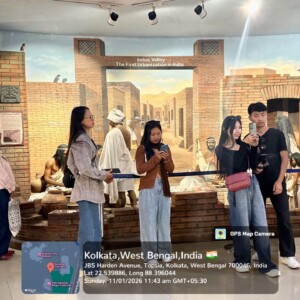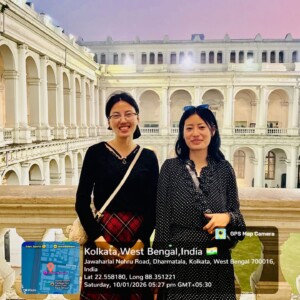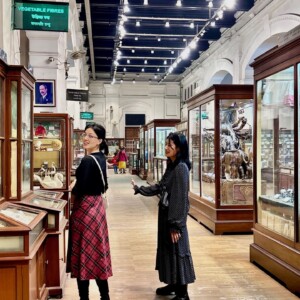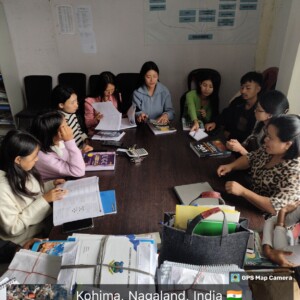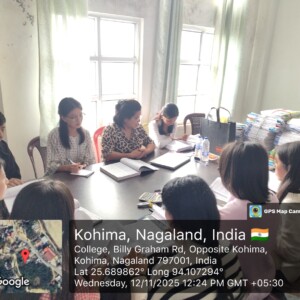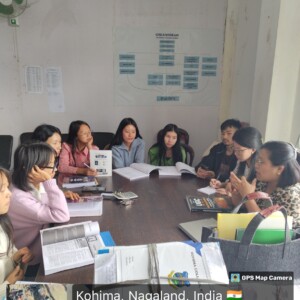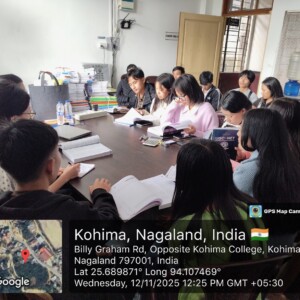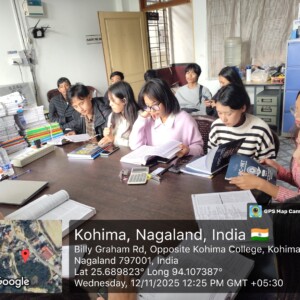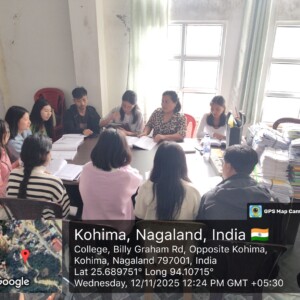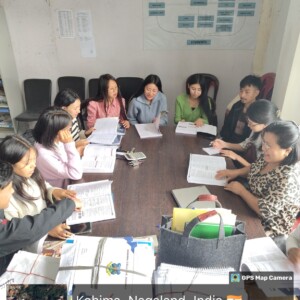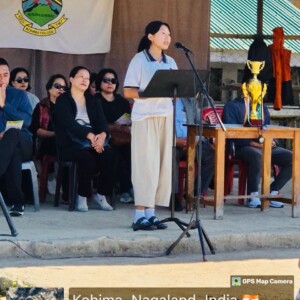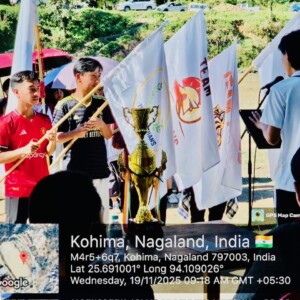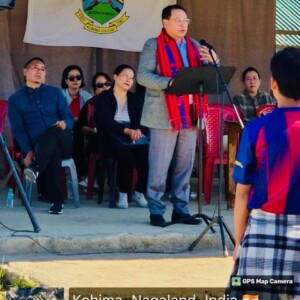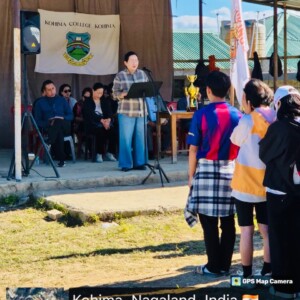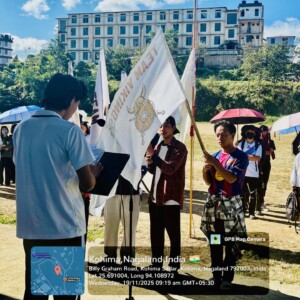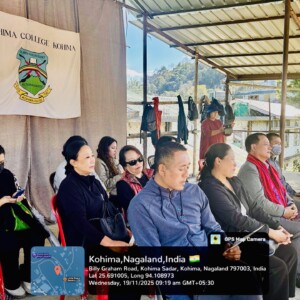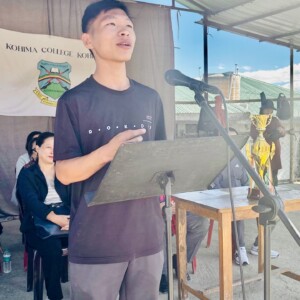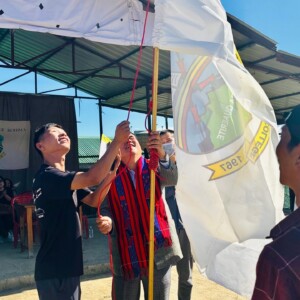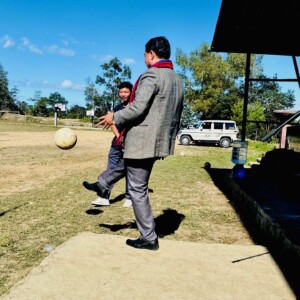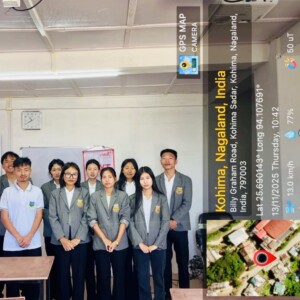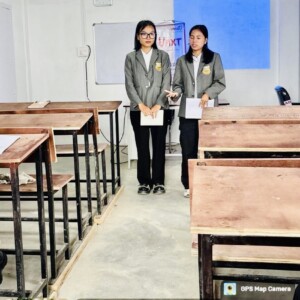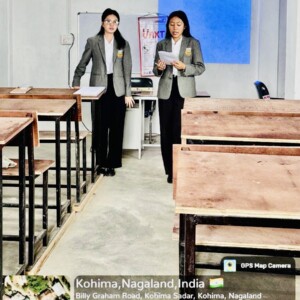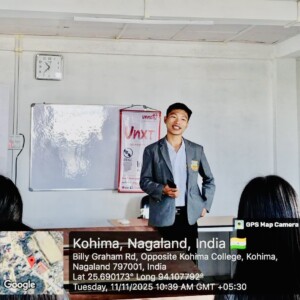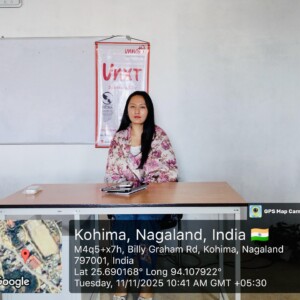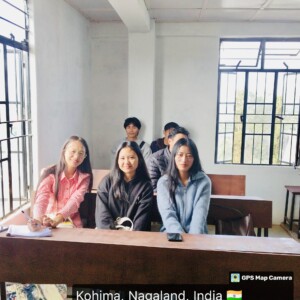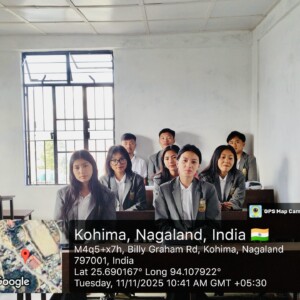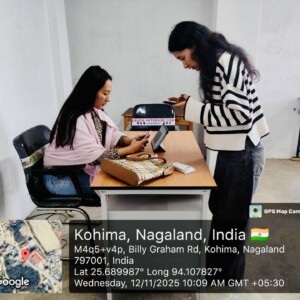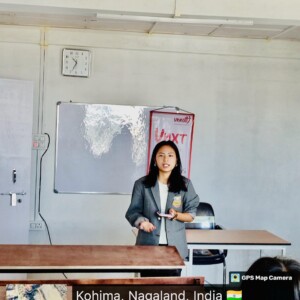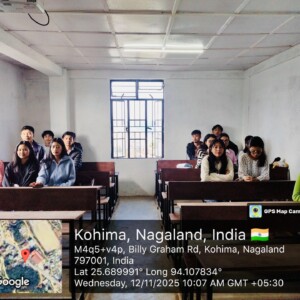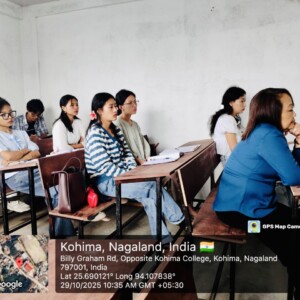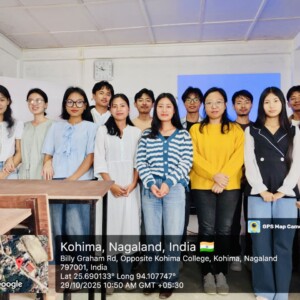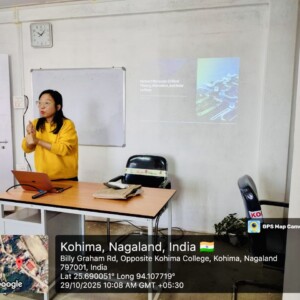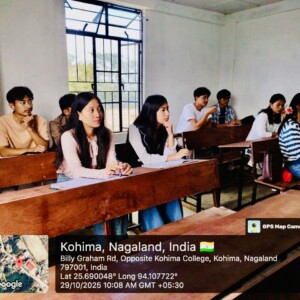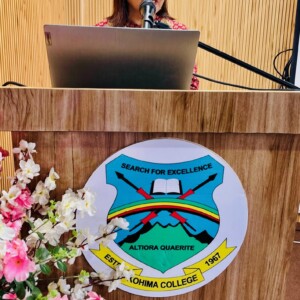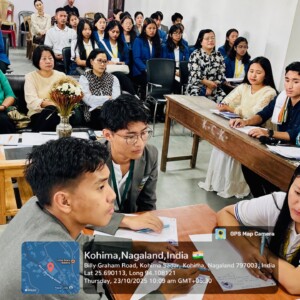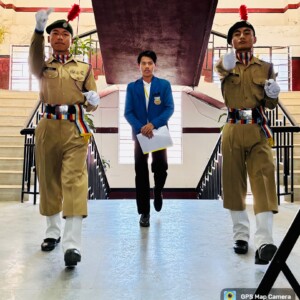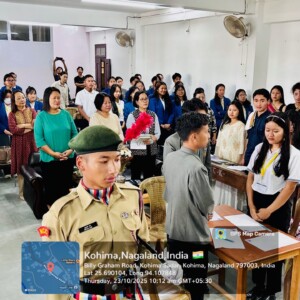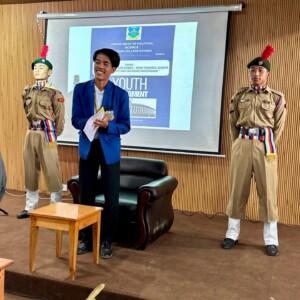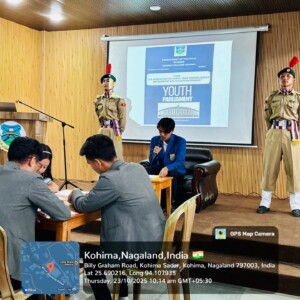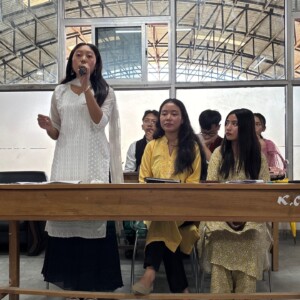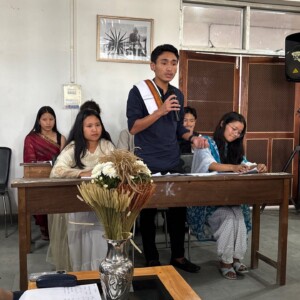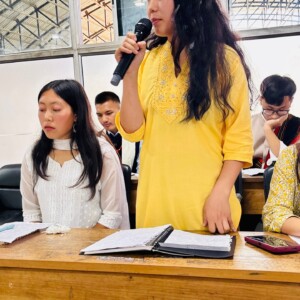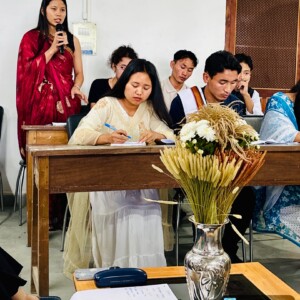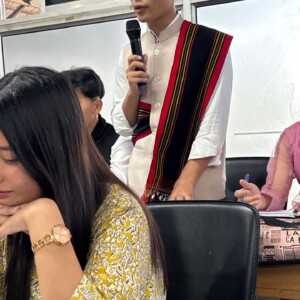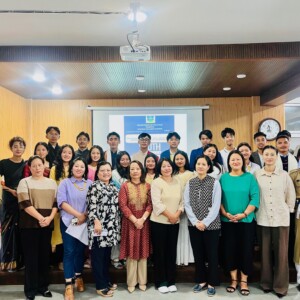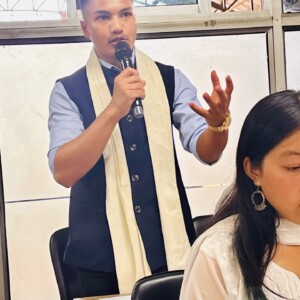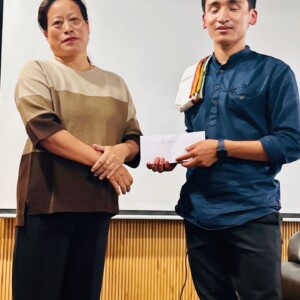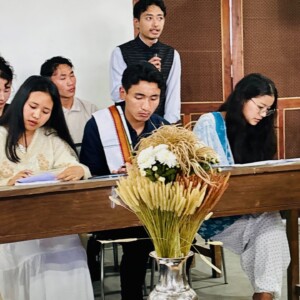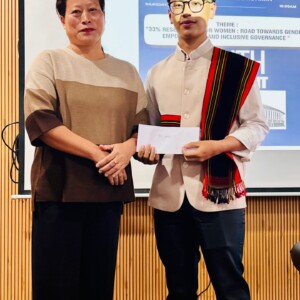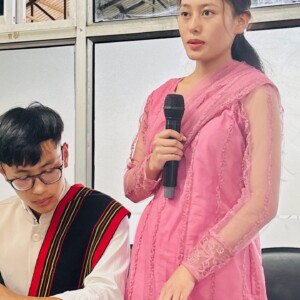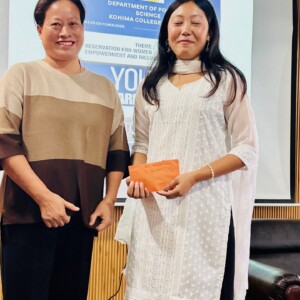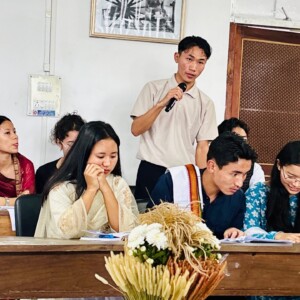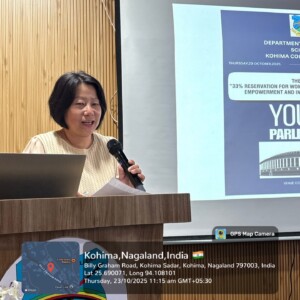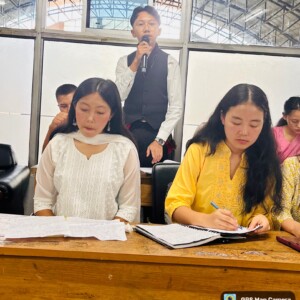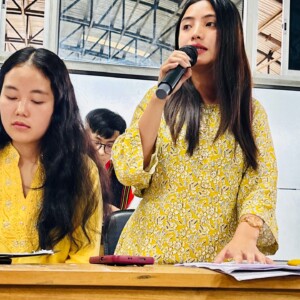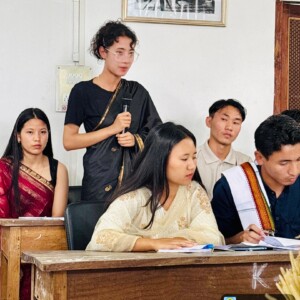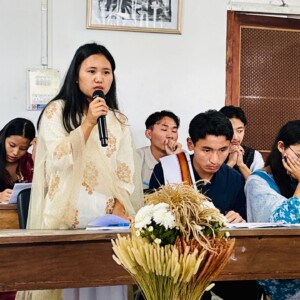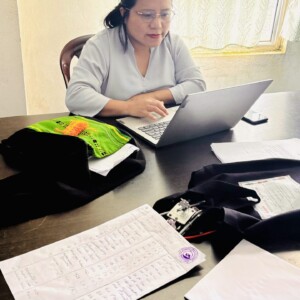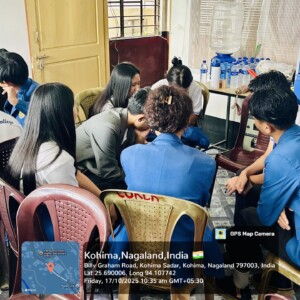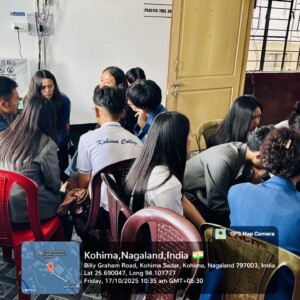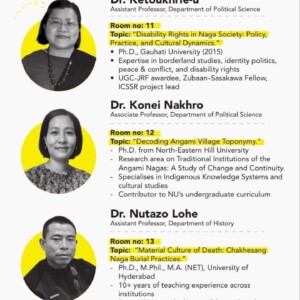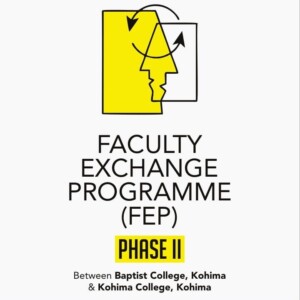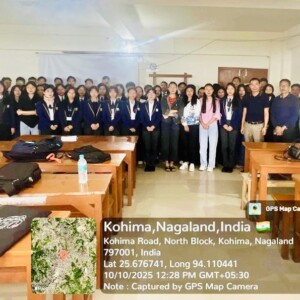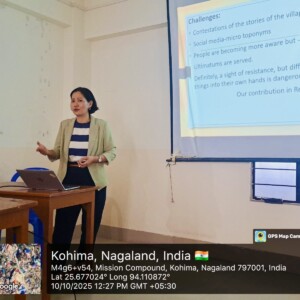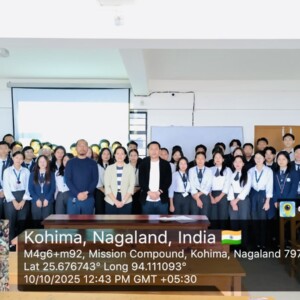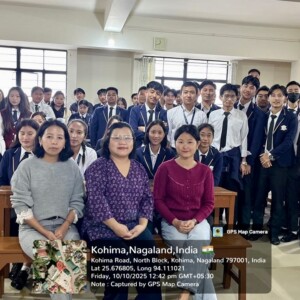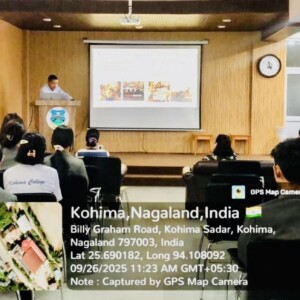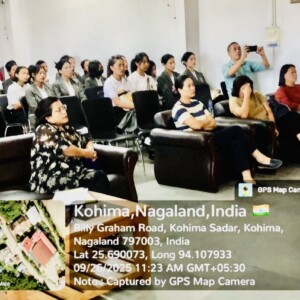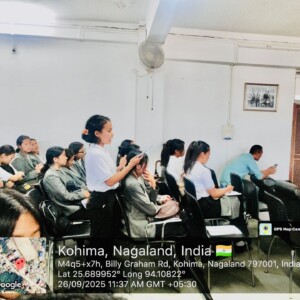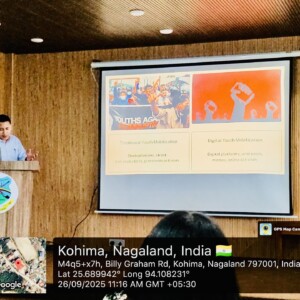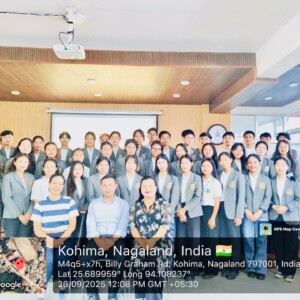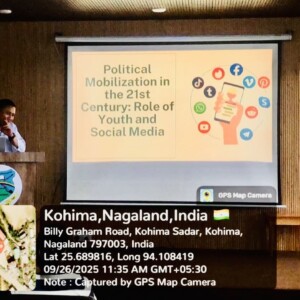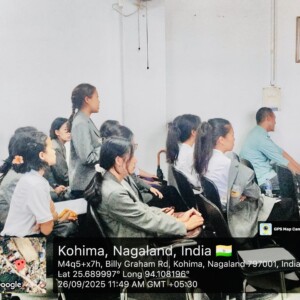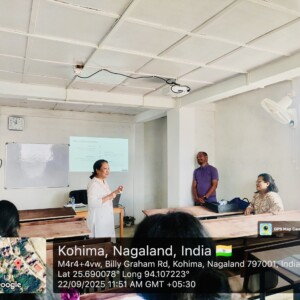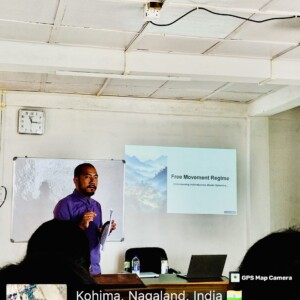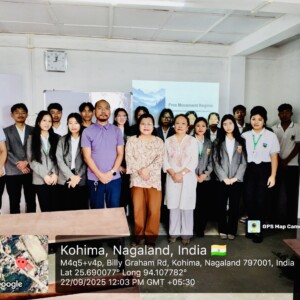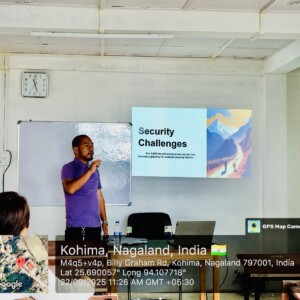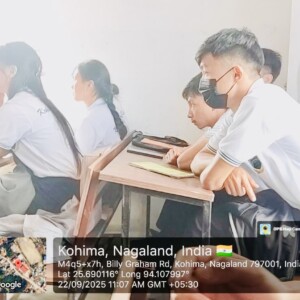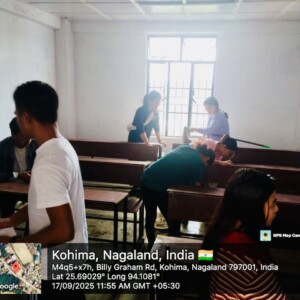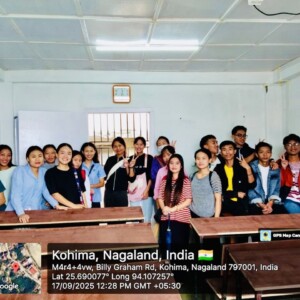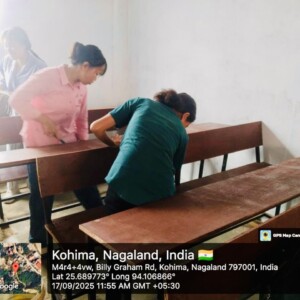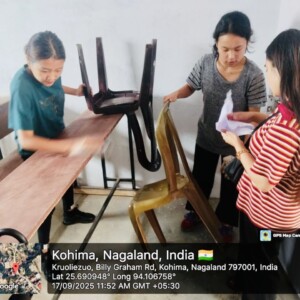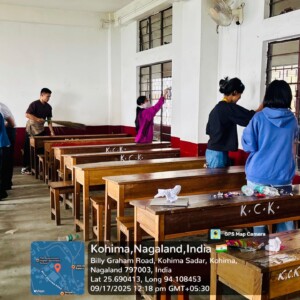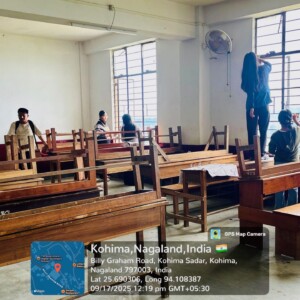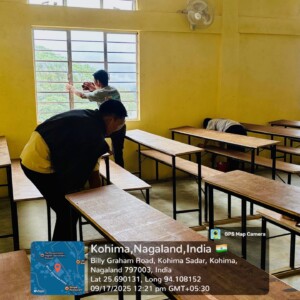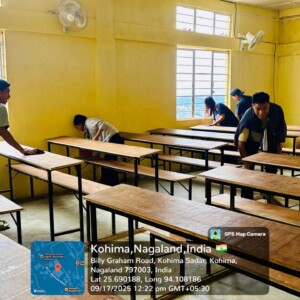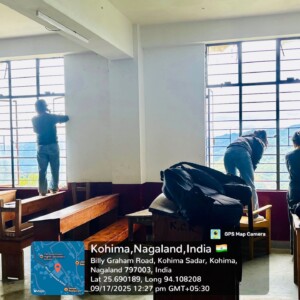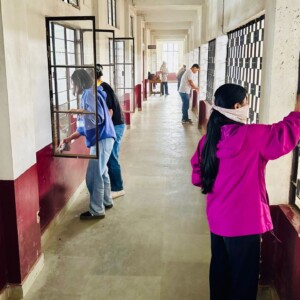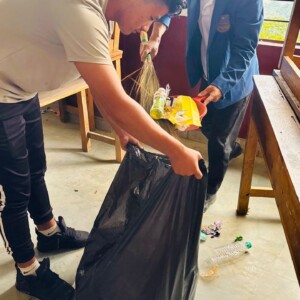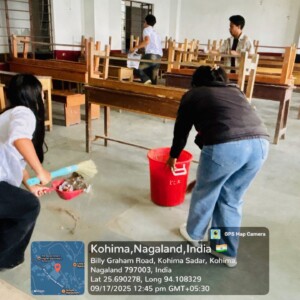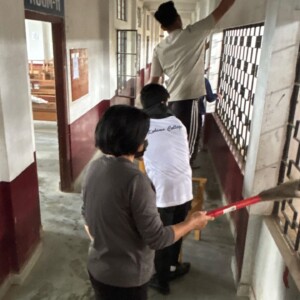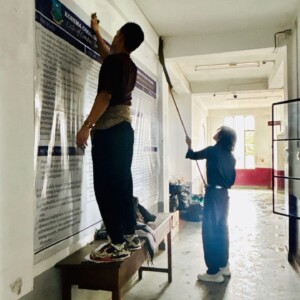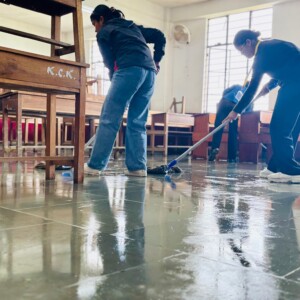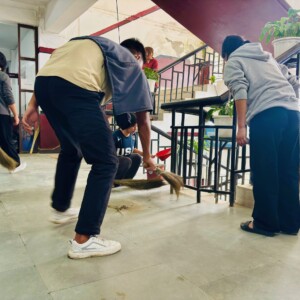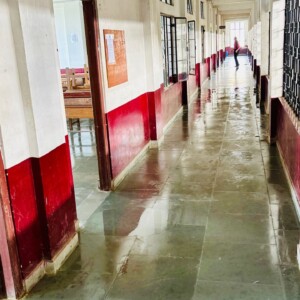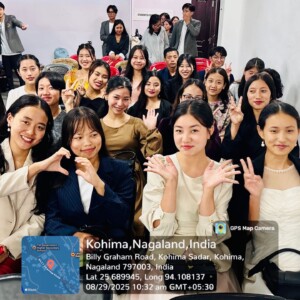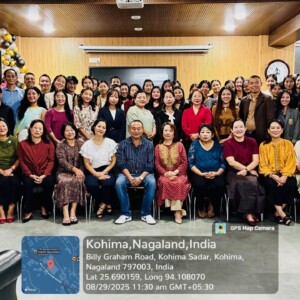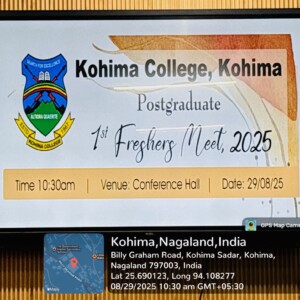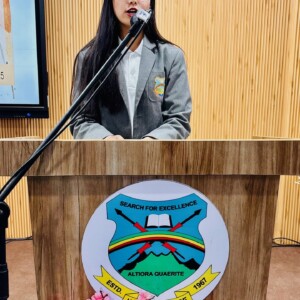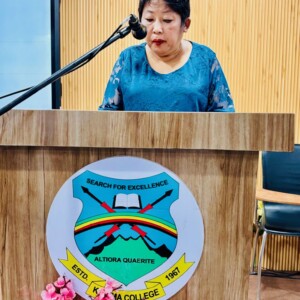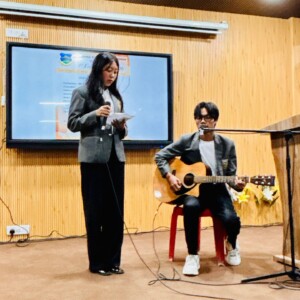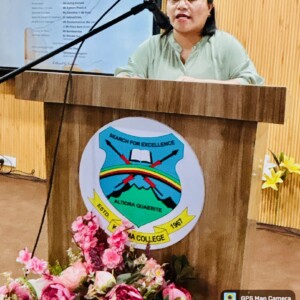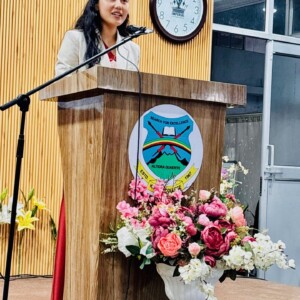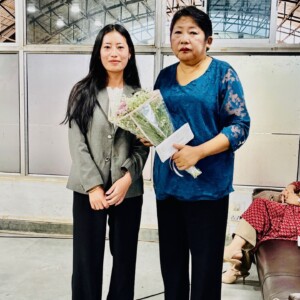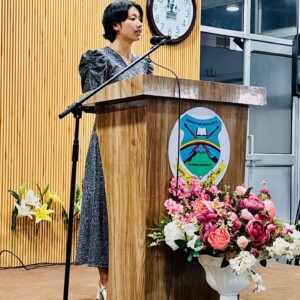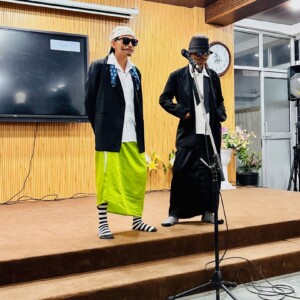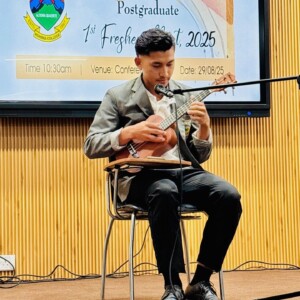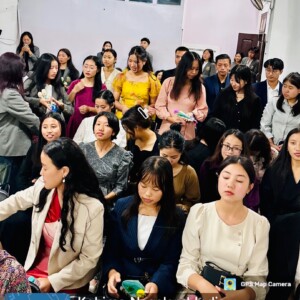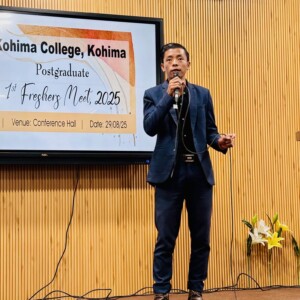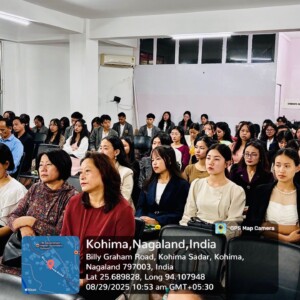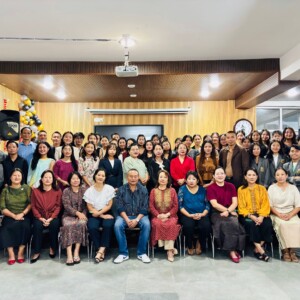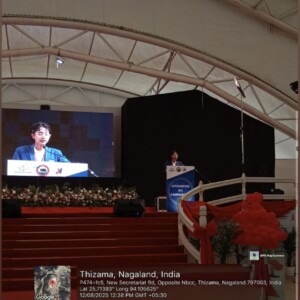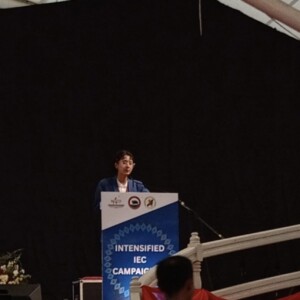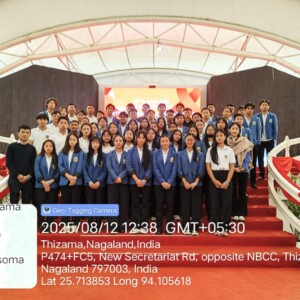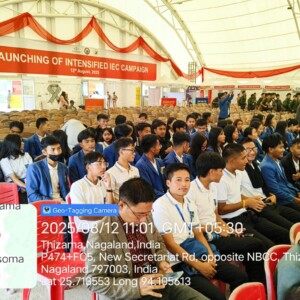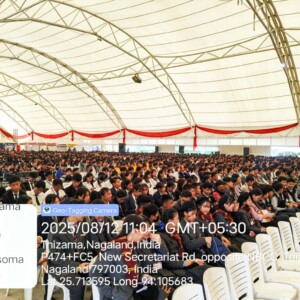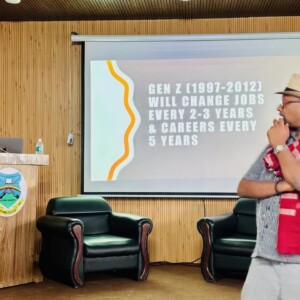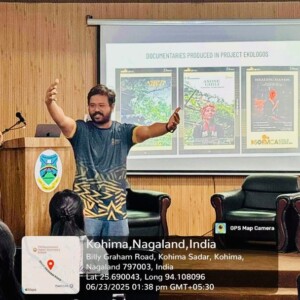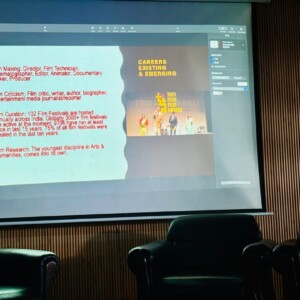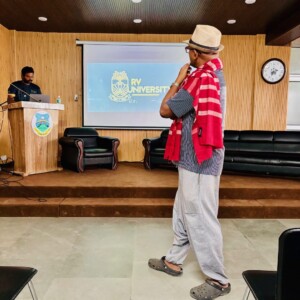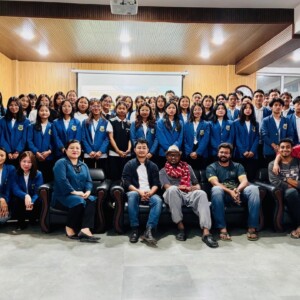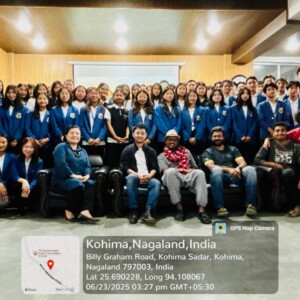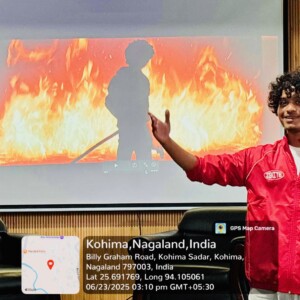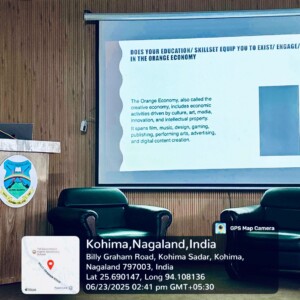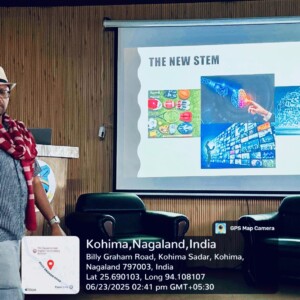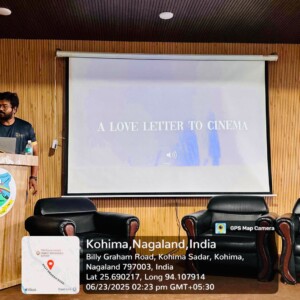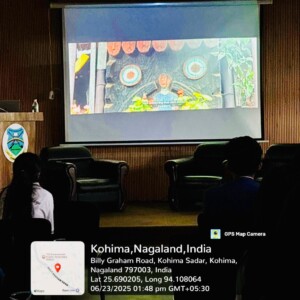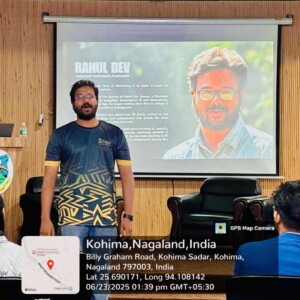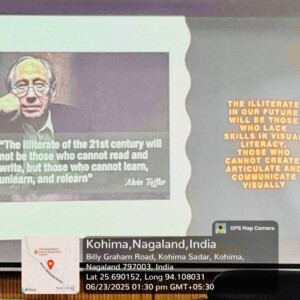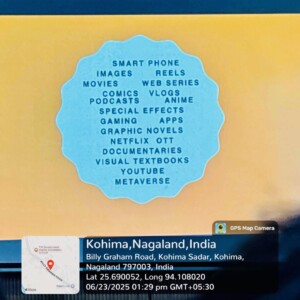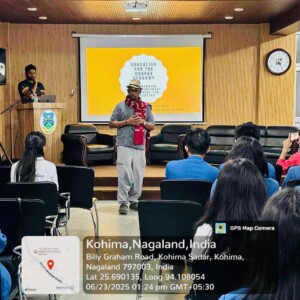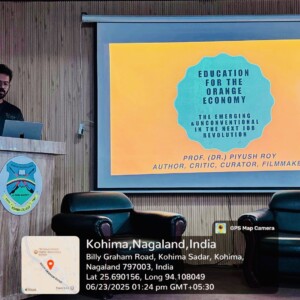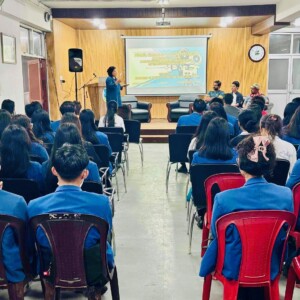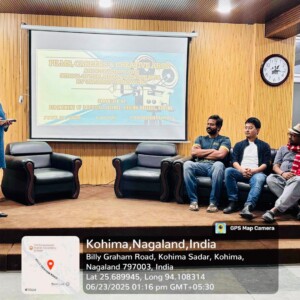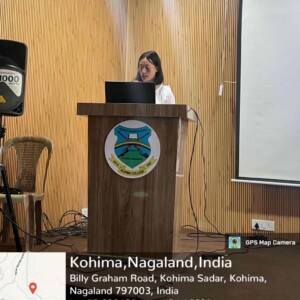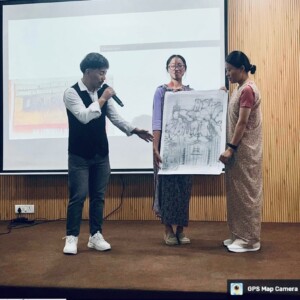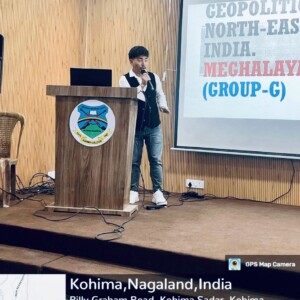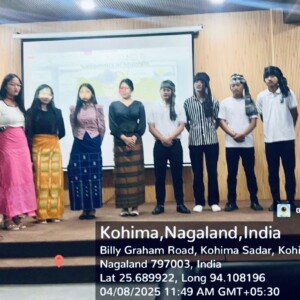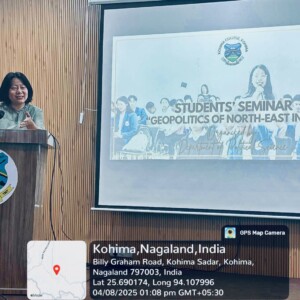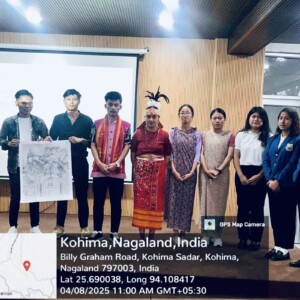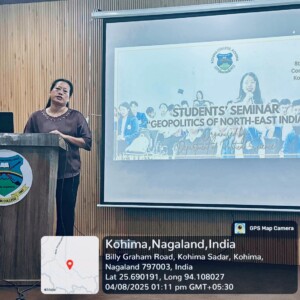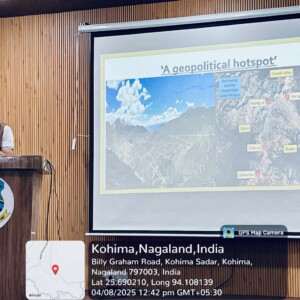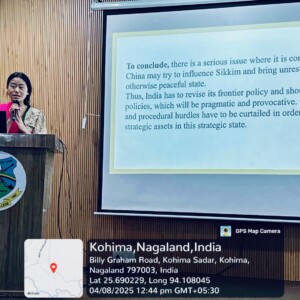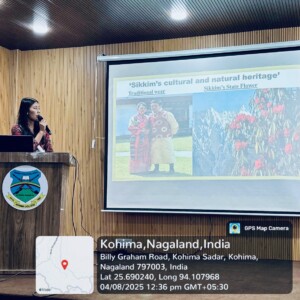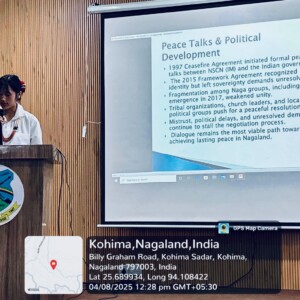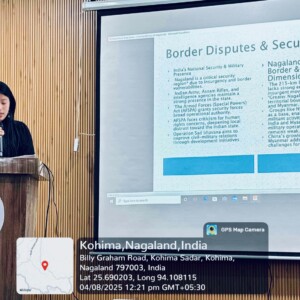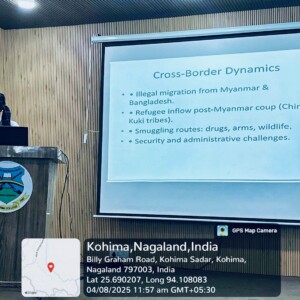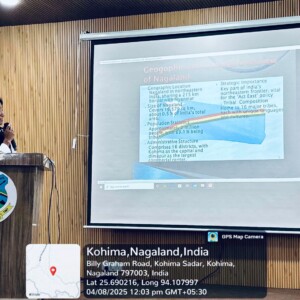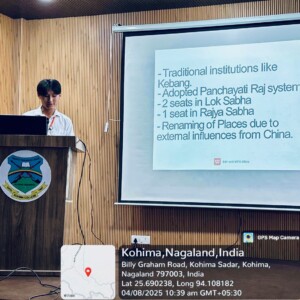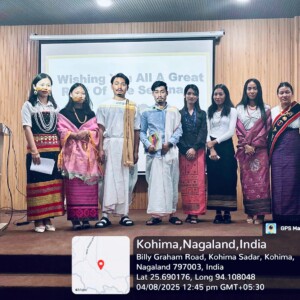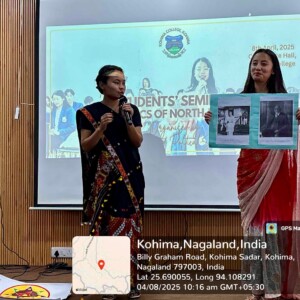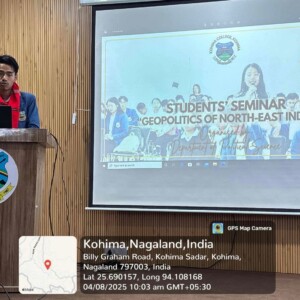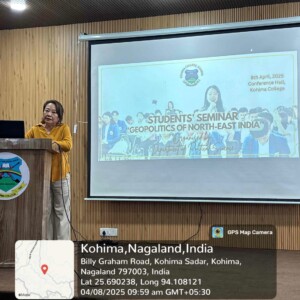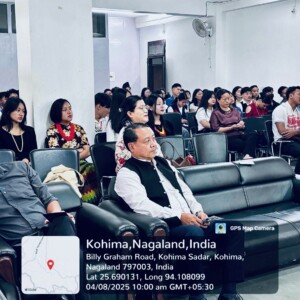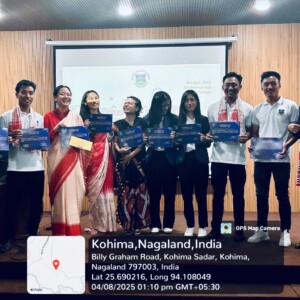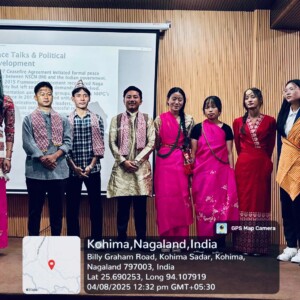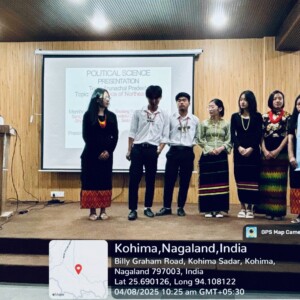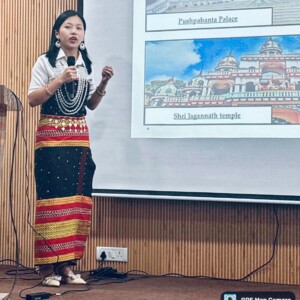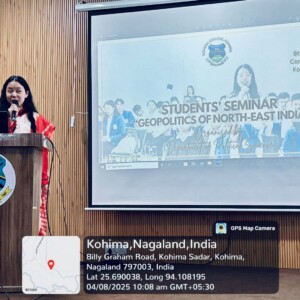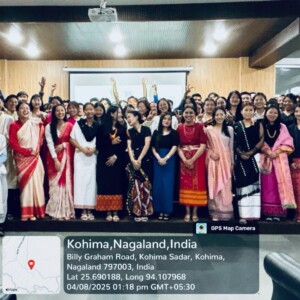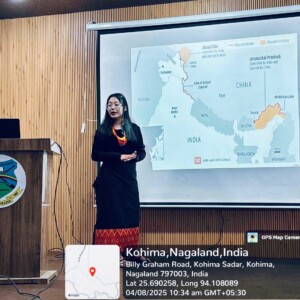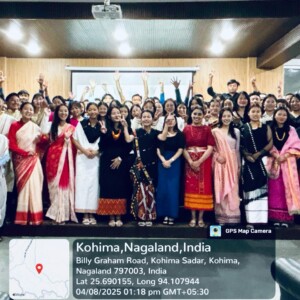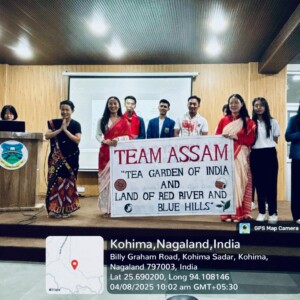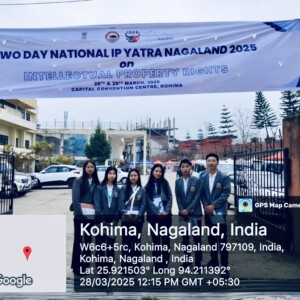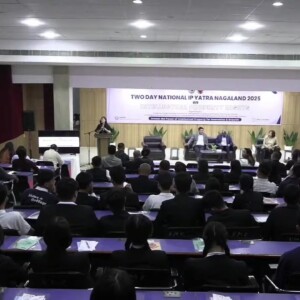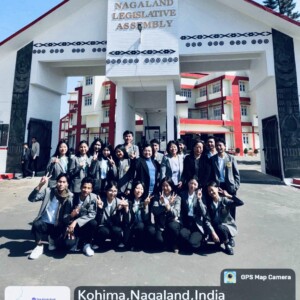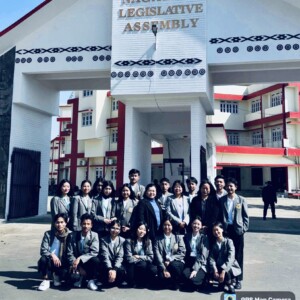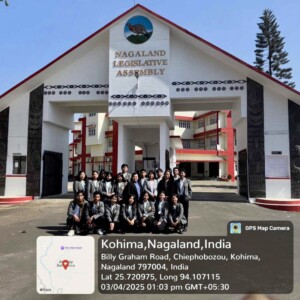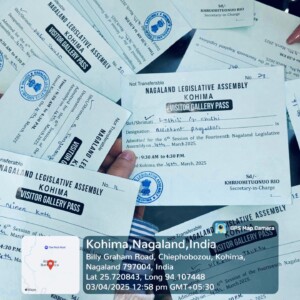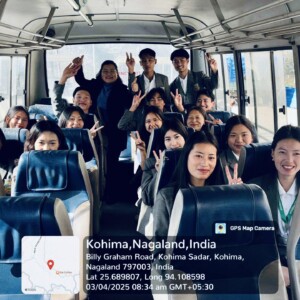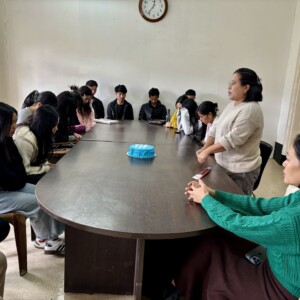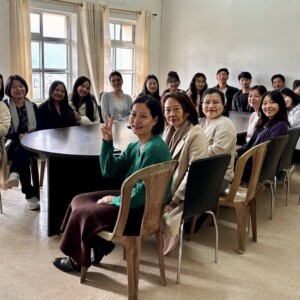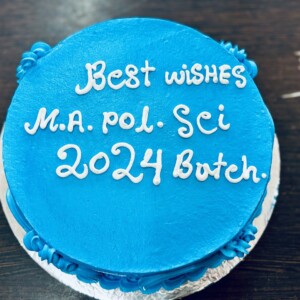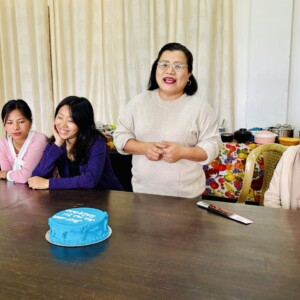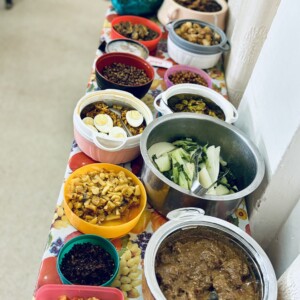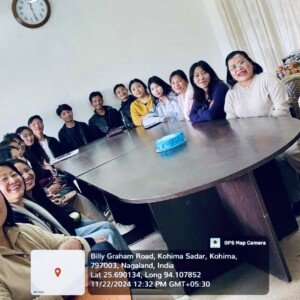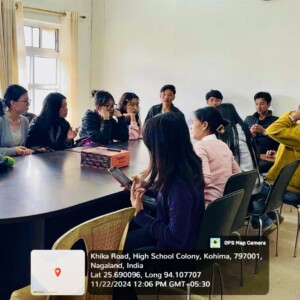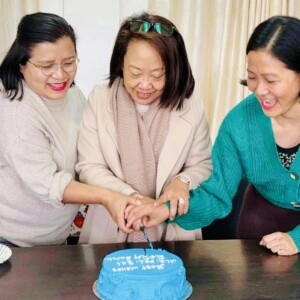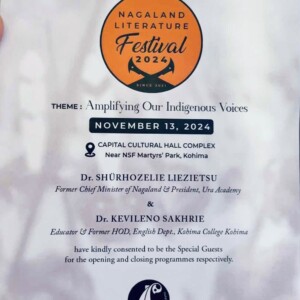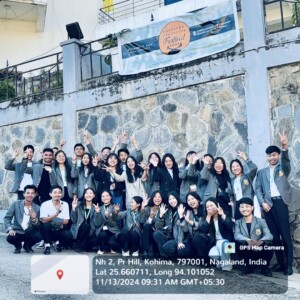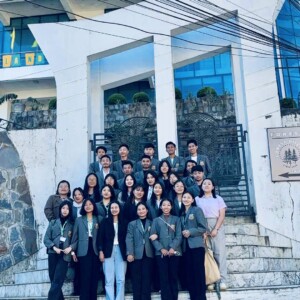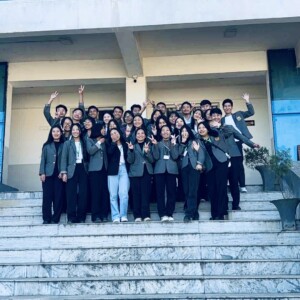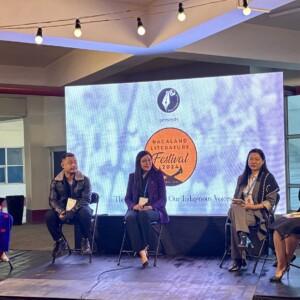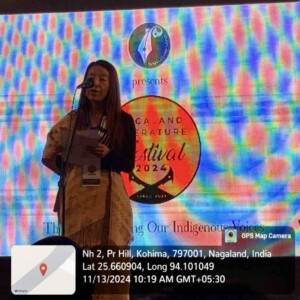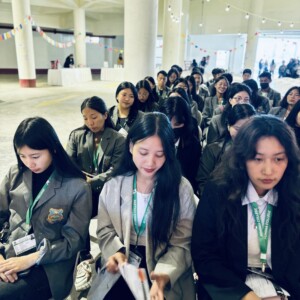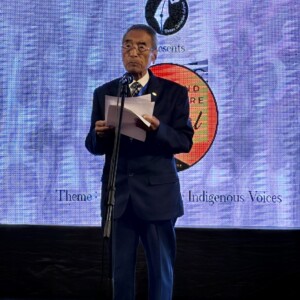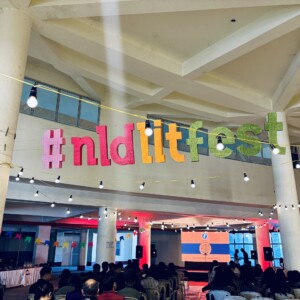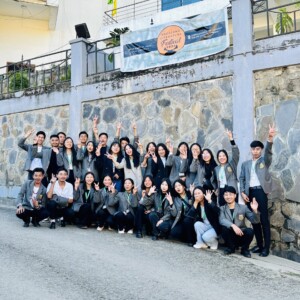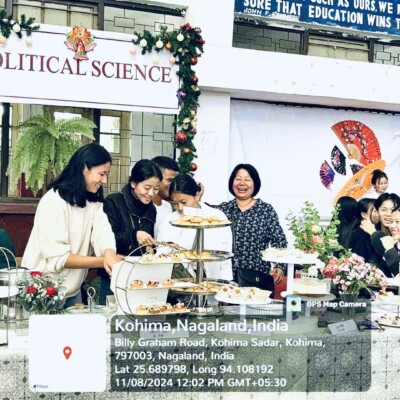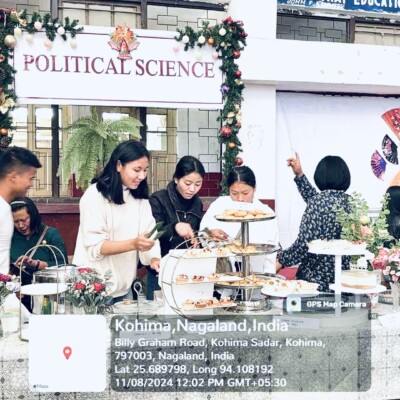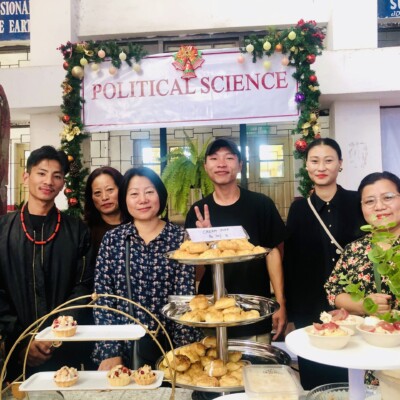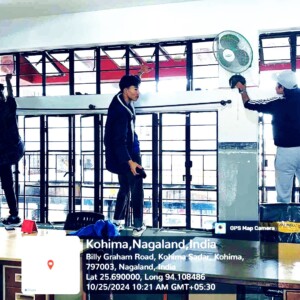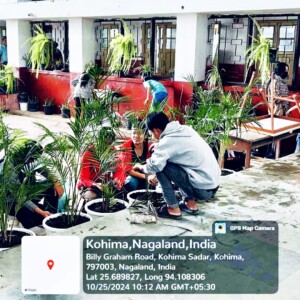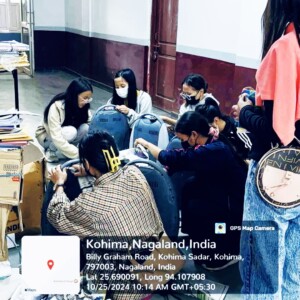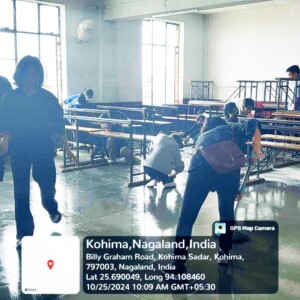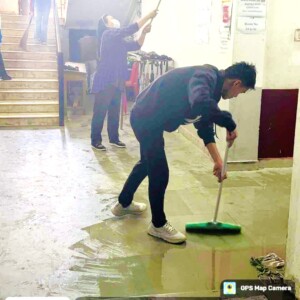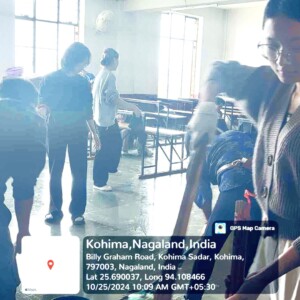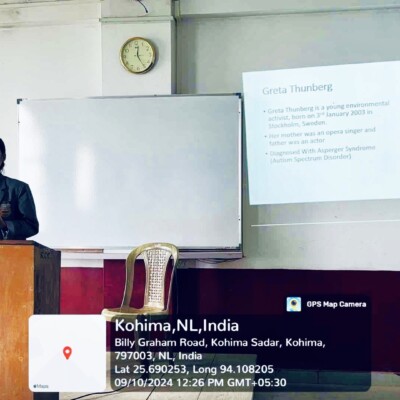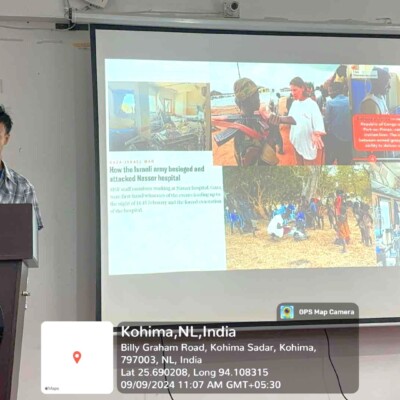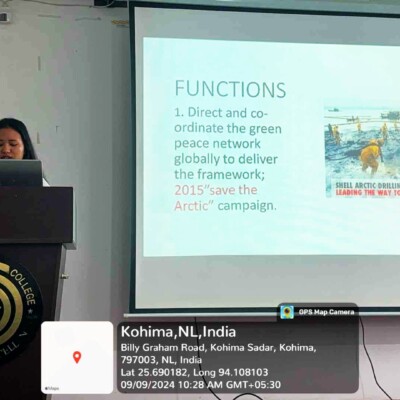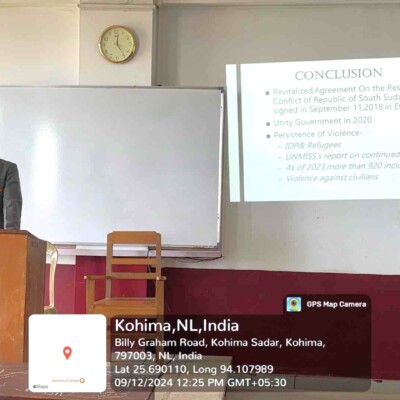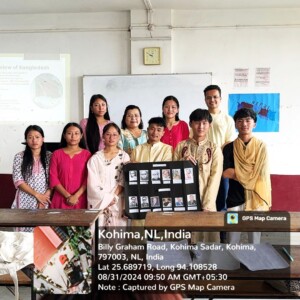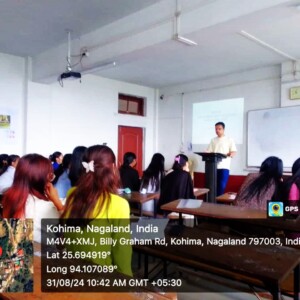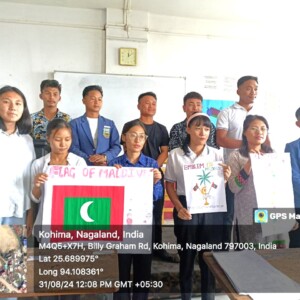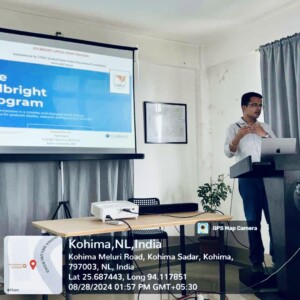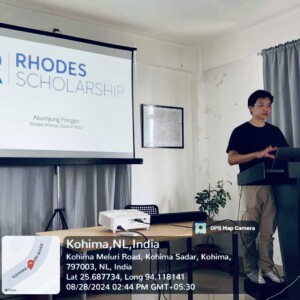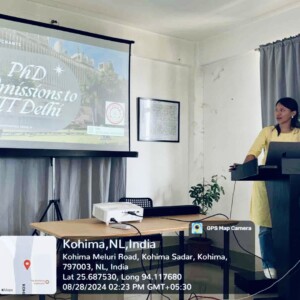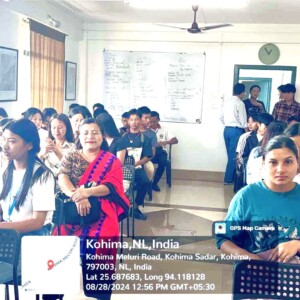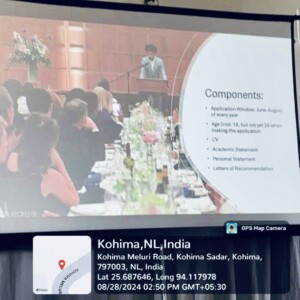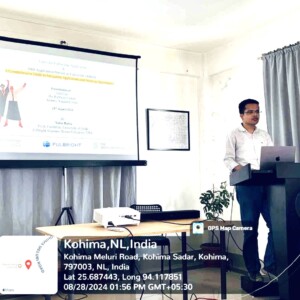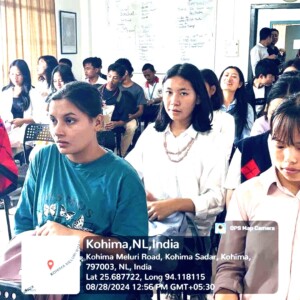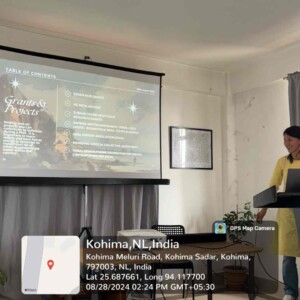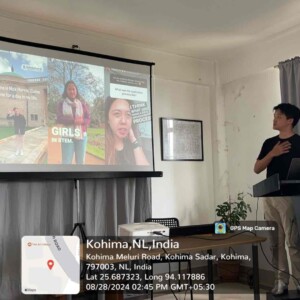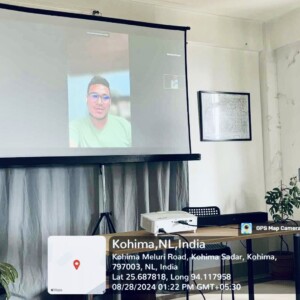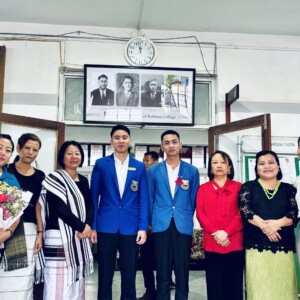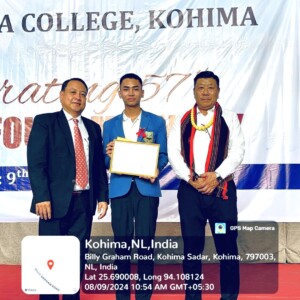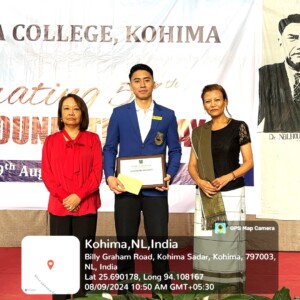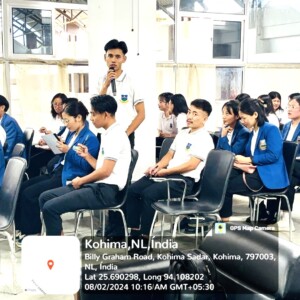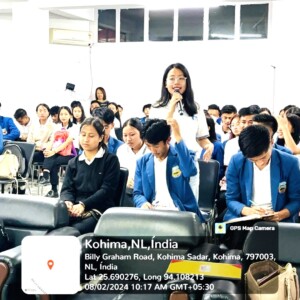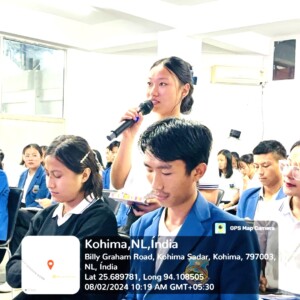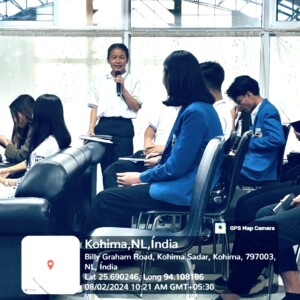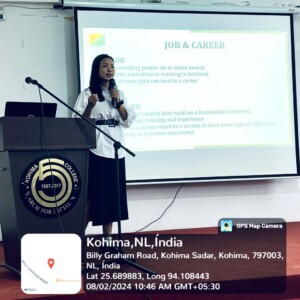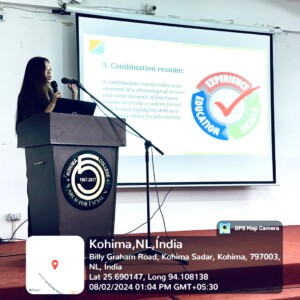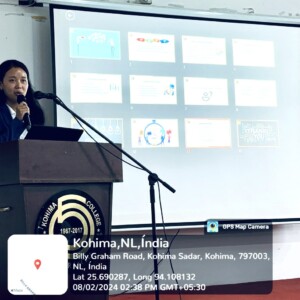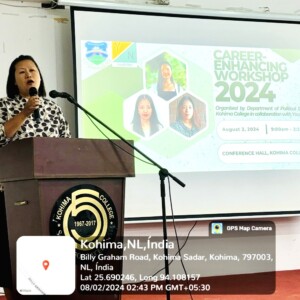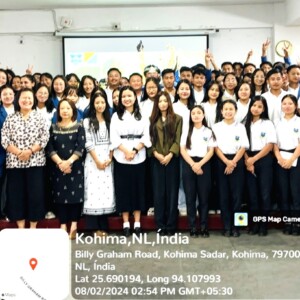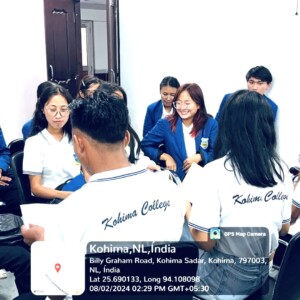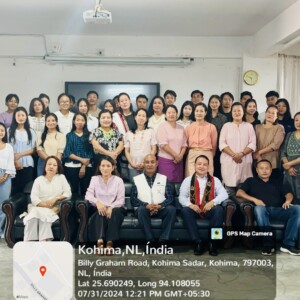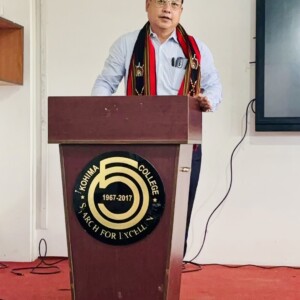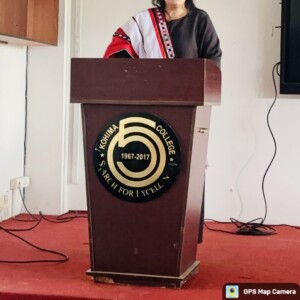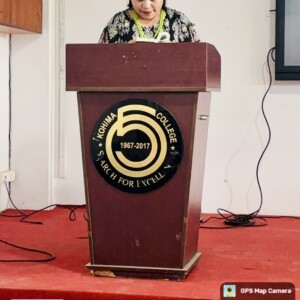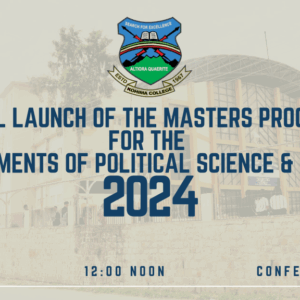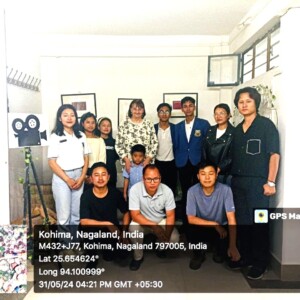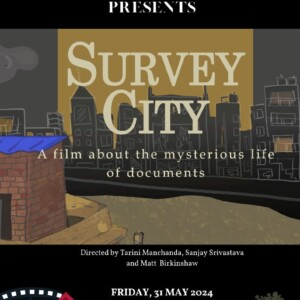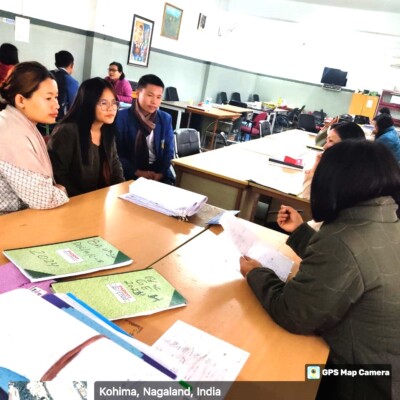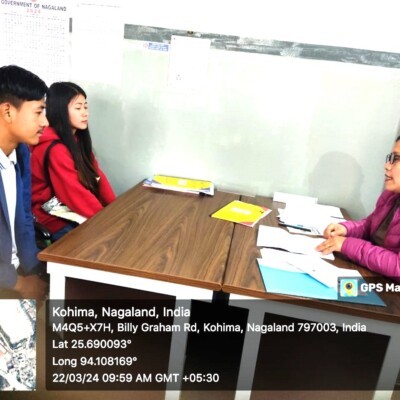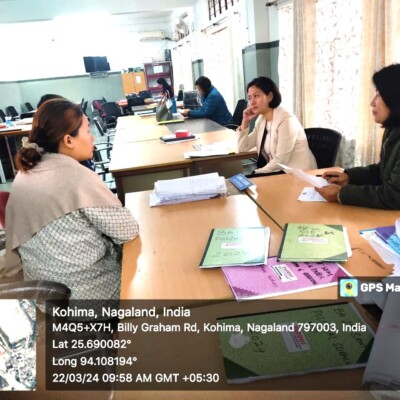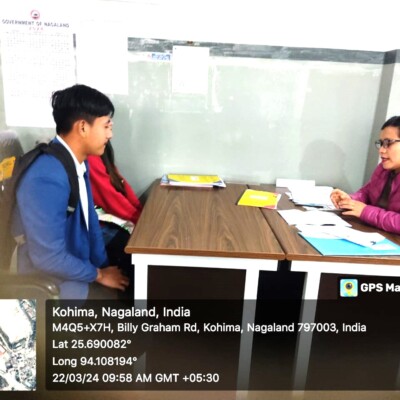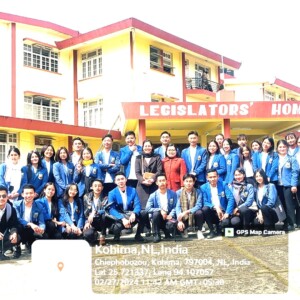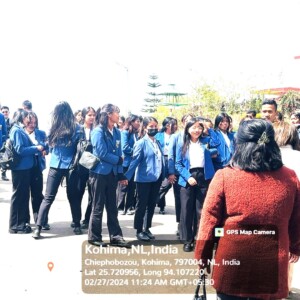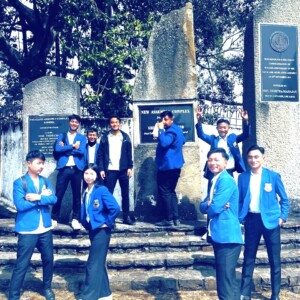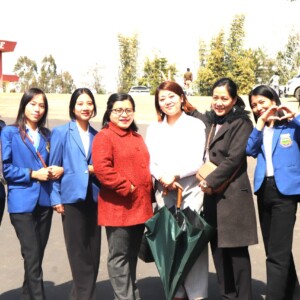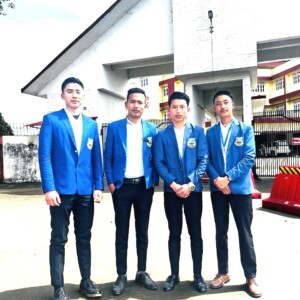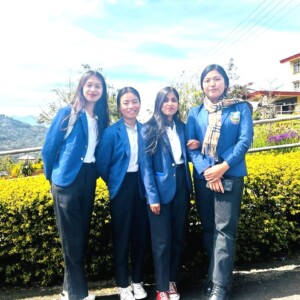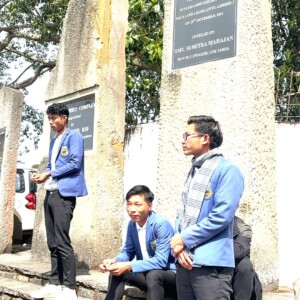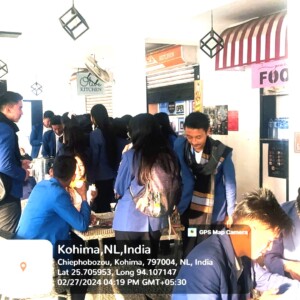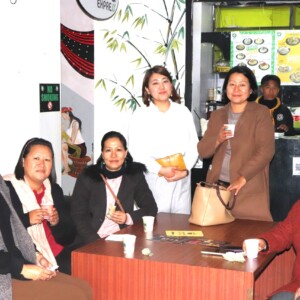January 8-14, 2026: Political Science Postgraduates, Kohima College Explore Kolkata on Educational Tour
16 postgraduate students from the Dept. of Political Science at Kohima College, accompanied by Assistant Professors Dr. Ketoukhrieü and Lashili G. Chishi, recently completed a week-long educational tour of Kolkata, themed “Kolkata – City of Joy: Engaging with India’s Political and Cultural Landscape”. The trip, which took place from January 8 to 14, 2026, offered students an immersive experience in the city’s rich historical, cultural, and scientific landmarks.
On the first day, the group visited iconic sites including the Victoria Memorial, St. Paul’s Cathedral, Birla Planetarium, and the Indian Museum, providing students with insights into Kolkata’s colonial and cultural heritage.
Day two featured visits to Science City, China Town, and the famous Howrah Bridge, along with a stop at the historic College Street, known for its bookstores and vibrant intellectual atmosphere. Students also experienced the city’s public transportation through a local bus and metro railway ride, gaining practical exposure to urban commuting in Kolkata.
The third day combined leisure with learning at Nicco Park, followed by shopping at South City Mall and an INOX Imax movie experience, offering a glimpse into contemporary urban culture. On the final day, students explored the bustling New Market before returning to Kohima by train in the evening.
The tour provided students with a balanced blend of education, culture, and hands-on experiences, offering a deeper appreciation of India’s diverse political, social, and cultural landscapes.
The trip was widely appreciated by students, who described it as a “memorable journey blending education, culture, and exploration”.
Nov 3-12, 2025: Department of Political Science conducts a One-Week Workshop on UGC-NET Exam Orientation Classes for MA 3rd semester students
Department of Political Science, Kohima College Kohima Nagaland conducted UGC NET EXAM Orientation classes from 3rd to 12th November, 2025, with a MOCK test on 12th November 2025 after an intensive one week workshop on how to prepare for UGC NET exam and career prospects in higher education in India and abroad.
Nov 19, 2025: Departments of Political Science & History organised Sports Day for the Post-Graduate students, Kohima College
Departments of Political Science & History, Kohima College organised the 1st Post-Graduate Sports Competition 2025.
The programme flagged off with an address by Dr Vitsosie Vupru, Principal, Kohima College, followed through by the oath-taking by the four (4) participating teams and the flag-hoisting ceremony.
The events for this day were-Running races (100m & 400m), shot put, discus throw, volleyball, penalty shoot-out & tug-of-war.
Concluding this event is the friendly match of football between History & Political Science departments.
Oct 27-Nov 12, 2025: 3rd Semester Masters students from the Department of Political Science, provided with Soft Skills Course through UNXT Softskills Course
UNXT Soft Skills Course was organised for the 3rd Semester Post-Graduates from the Political Science Department. This course occurred in three phases.
The first phase focused on Confidence-Building, Goal-Setting, Time and Stress Management and positive attitude.
The second phase included communication skills like speaking and listening, crucial professional skills such as Creating of resumes, workplace behaviour and the importance of teamwork.
The final phase focused on values and personality development. The course ended with assessments and practical activities, along with ongoing app-based learning and placement support.
The course was immensely helpful for the students who were soon to join work industries & further research activities.
October 29, 2025: Intra-College Faculty Exchange Lecture on “Herbert Marcuse”, a collaborative initiative between Departments of Political Science & Sociology, Kohima College
In an effort to promote inter-departmental teaching and learning collaboration, the Department of Political Science, Kohima College, organised a special lecture for the MA 3rd semester students on the topic “Herbert Marcuse: Critical Theory, Alienation & New Theory”.
The lecture was delivered by Assistant Professor Aosangla Longkumer from the Department of Sociology, Kohima College, who emphasised the importance of interdisciplinary approaches in understanding complex social and political ideas.
During her session, Longkumer provided deep insights into Marcuse’s critical theory, his interpretation of alienation, and how his ideas continue to influence contemporary sociological and political thought. She encouraged students to explore the intersections between sociology and political science to better grasp the philosophical underpinnings of modern social theory.
The session was well-received by the students, who actively engaged in discussion and appreciated the opportunity to view political theory through a sociological lens. The initiative reflects Kohima College’s ongoing commitment to fostering interdisciplinary learning and broadening academic perspectives among postgraduate students. the Youth Parliament as a platform to nurture political awareness and democratic values among students.
Oct. 23, 2025: Department of Political Science organised the 1st Youth Parliament in Kohima College on Women’s Reservation Bill
The Department of Political Science, Kohima College, successfully organised its 1st Youth Parliament on the theme “33% Reservation for Women: Road towards Gender Empowerment and Inclusive Governance”. The event provided a vibrant platform for students to engage in a simulated parliamentary session and debate one of India’s most significant contemporary issues.
The programme began with a welcome address by Tiakumla Jamir, Associate Professor and Head of the Department of Political Science. The Speaker of the House for the session was Wati Lkr, a Political Science Honours student from the 3rd Semester. The panel of judges comprised of Dr. Konei Nakhro, Ase Yalie, and Kevinguno Rose, all Associate Professors from the Department of Political Science.
During the session, participants representing both the ruling and opposition parties presented spirited arguments. Members of the ruling party emphasised that the 33% reservation for women in political institutions was a necessary step towards bridging the gender gap in governance. They argued that India, despite being one of the world’s largest democracies with women constituting nearly half its population, continues to witness poor representation of women in politics — with only about 15% at the national level and less than 10% in many state assemblies. Speakers highlighted how societal barriers, domestic violence, and fear of harassment discourage women from entering political life, calling the bill a progressive step towards correcting historical inequality.
The opposition, however, raised critical concerns about the timing and implementation of the bill. They questioned the linkage of the Women’s Reservation Bill to future census and delimitation exercises, warning that such provisions could delay its enforcement. Several speakers also pointed out the absence of sub-reservation for OBC women and cautioned against the possibility of “elite capture,” where urban or privileged women might dominate the reserved seats while rural and marginalised women remain excluded.
Opposition members further argued that while they strongly supported women’s empowerment, true empowerment must arise from education, training, and social reform rather than dependency on reservation. One speaker noted, “Political participation should come through competence and leadership, not gender-based entitlement. We have seen women leaders like Indira Gandhi and Jayalalithaa rise without reservation — proving that women can lead through merit.”
The debate was intense yet constructive, with participants demonstrating impressive research, critical thinking, and oratory skills. The Speaker of the House lauded the participants for maintaining the spirit of parliamentary decorum and encouraging informed civic engagement.
At the end of the event, the results were declared:
- Lenvishe (MA 1st Semester) – 1st Prize (₹2000 & Certificate)
- Kekhrievor (BA 1st Semester) – 2nd Prize (₹1000 & Certificate)
- Vetazo Veswuh (BA 5th Semester) – 3rd Prize (₹800 & Certificate)
The event concluded with closing remarks by the judges, who commended the Department for initiating the Youth Parliament as a platform to nurture political awareness and democratic values among students.
Oct 17, 2025: Orientation for 1st Youth Parliament 2025, Organised by Department of Political Science, Kohima College
Faculty members Dr Ketoukhrieü & Lashili G Chishi, both Assistant Professors, oriented the BA & MA student participants of Political Science Department on how Youth Parliament procedures following Lok Sabha model is held, as most of the students were 1st time participants.
This initiative has been started by Department of Political Science, Kohima College, for the 1st time in Kohima College history. The intent of this event is to inculcate students with knowledge of parliamentary procedures in practice (both for participants & student observers) & the importance of the role of parliamentarians in democratic decision-making processes.
October 10, 2025: Department of Political Science Faculty participated in Phase-II of the Faculty Exchange Programme Strengthening Academic Collaboration Between Kohima & Baptist Colleges
Kohima College, Kohima, in collaboration with Baptist College, Kohima, successfully conducted Phase II of the Faculty Exchange Programme (FEP) on October 10, 2025. The event, held at Baptist College, aimed to foster collaborative learning and intellectual exchange among faculty members and students of both institutions.
The session featured insightful presentations from distinguished scholars from the Departments of Political Science & History, Kohima College.
Dr. Ketoukhrië-ü, Assistant Professor in the Department of Political Science, presented a paper on “Disability Rights in Naga Society: Policy, Practice, and Cultural Dynamics”. Drawing on her expertise in borderland studies, identity politics, peace and conflict, and disability rights, Dr. Ketoukhrië-ü emphasised the need for inclusive policy frameworks and greater awareness of disability issues within Naga society.
Dr. Konei Nakhro, Associate Professor in the Department of Political Science, spoke on “Decoding Angami Village Toponymy”. Her presentation explored the linguistic and cultural significance of village names among the Angami Nagas, highlighting how traditional institutions and indigenous knowledge systems shape identity and collective memory.
Dr. Nutazo Lohe, Assistant Professor in the Department of History, presented on “Material Culture of Death: Chakhesang Naga Burial Practices”. With over a decade of research and teaching experience, Dr. Lohe discussed burial traditions, megalithic culture, and how these practices reflect the spiritual and social dimensions of Naga identity.
The Faculty Exchange Programme provided a valuable platform for dialogue and the dissemination of local research, enhancing mutual understanding and academic partnership between the two colleges. Students and faculty members actively engaged with the speakers, making the session both informative and intellectually stimulating.
The event concluded with an appreciation of the speakers for their contributions to promoting indigenous knowledge, research collaboration, and academic excellence in Nagaland.
Sept 26, 2025: Department of Political Science, Kohima College, hosted the 3rd Session of the Faculty Exchange Programme 2025 Held at Kohima College
The Internal Quality Assurance Cell (IQAC) of Baptist College, Kohima, in collaboration with the IQAC & Department of Political Science, Kohima College, successfully organised a Faculty Exchange Programme 2025 at Kohima College.
Assistant Professor Seyiesilie Vüpfü, Department of Political Science, Baptist College, was the visiting faculty for the programme. He delivered a lecture on the topic “Political Mobilization in the 21st Century: Role of Youth and Social Media.”
In his presentation, Vüpfü highlighted how youth, empowered by social media platforms, have become vital agents of political mobilisation in contemporary societies. He stressed that while digital spaces provide unprecedented opportunities for participation, awareness, and activism, they also demand responsibility, critical thinking, and ethical engagement.
Vüpfü, who holds a Master’s degree with NET from the University of Hyderabad, is the co-editor of Discourses on Cultural Heritage in Contemporary Nagaland. He has previously chaired technical sessions and presented research on Naga identity and recognition, drawing on Francis Fukuyama’s framework of identity politics.
The programme, hosted by the Department of Political Science, Kohima College, saw active participation from students and faculty members. It provided a platform for academic exchange, intellectual enrichment, and collaboration between the two institutions.
The session concluded with an interactive discussion, where students engaged with the resource person on pressing issues of youth participation in democratic processes and the challenges posed by the digital age.
September 22, 2025: Faculty Exchange Programme 2025 at Kohima College, Organised by IQACs of Kohima College & Baptist College, in collaboration with Department of Political Science, Kohima College
The Internal Quality Assurance Cells (IQAC) of Kohima College and Baptist College, in collaboration with the Department of Political Science, Kohima College, jointly launched the Faculty Exchange Programme 2025 today.
Marking the beginning of the initiative, Assistant Professor L. Thsidelong Sangtam, visiting faculty from Baptist College, delivered a lecture on the theme “Free Movement Regime” to the third semester students of MA Political Science at Kohima College.
The session offered students deeper insights into the complexities of free movement across borders, its implications for international relations, and the relevance of such regimes in contemporary political discourse. Students engaged with the lecture and gained fresh perspectives on the subject, benefitting from the interactive academic exchange.
The Faculty Exchange Programme aims to enhance teaching–learning practices, encourage collaboration between institutions, and broaden the academic exposure of both faculty and students. Officials from both colleges expressed optimism that the initiative will foster a culture of knowledge-sharing and strengthen academic ties.
Sept 17, 2025: Department of Political Science participated in the Mass Social Work organised by Swachch Bharat Abhiyan in collaboration with the Department of Higher Education & Tourism Department, GoN, also marking the birthday of PM of India, Shri Narendra Modi
In observance of the nationwide campaign “Swachhta Hi Seva 2025”, under the flagship of the Swachh Bharat Mission, the Kohima College Unit of Swachh Bharat Abjiyan organised a Mass Social Work on September 17, 2025. The programme was jointly conducted with the Department of Higher Education and the Tourism Department, Government of Nagaland (GoN). The event also coincided with the birthday of the Honourable Prime Minister of India, Shri Narendra Modi, adding special significance to the initiative.
The Department of Political Science, comprising teaching faculty and students from both undergraduate and postgraduate programmes, actively participated in the cleanliness drive. A total of 84 students volunteered in the event, demonstrating commendable enthusiasm and civic responsibility. Certificates of Appreciation were awarded to participating students, recognising their contribution to the Swachhta Hi Seva 2025 campaign.
The objectives of this initiative were:
1. To promote cleanliness and hygiene within the Kohima College campus and its surroundings.
2. To sensitise students and the local community on the importance of cleanliness and environmental stewardship.
3. To foster collective responsibility and civic consciousness among students.
4. To reaffirm the values and ideals of the Swachh Bharat Abhiyan, promoting the message of “Cleanliness is Service”
The cleanliness drive covered both academic and common areas of the college, focusing on:
1. Cleaning of classrooms, corridors, and administrative blocks.
2. Sweeping and waste collection within and around the college premises.
3. Segregation and proper disposal of waste materials.
4. Beautification and maintenance of the college garden and open spaces.
Outcome and Impact
The event was highly successful, with active participation from students, faculty, and staff members. It created a strong sense of community ownership and environmental responsibility among participants. The initiative not only improved the cleanliness of the college environment but also strengthened the ethos of public service and collective effort envisioned by the Swachh Bharat Mission.
The department also thanks all student volunteers for their spirited involvement and teamwork that made the programme a success. The Mass Social Work under Swachh Bharat Abhiyan reaffirmed the commitment of Kohima College to the national vision of a clean and healthy India. Through the collective efforts of students and faculty, the event achieved its goals of—spreading awareness, fostering civic responsibility, and strengthening community engagement.
Aug 29, 2025: 1st MA Freshers’ Meet 2025, Kohima College, Organised by Depts. Of Political Science & History, Kohima College
The 1st MA Freshers’ Meet 2025, Kohima College, Kohima, was held today at the College Conference Hall. The event, organised with much enthusiasm, welcoming the 2nd postgraduate batch into the institution.
The programme began at 10:30 am, chaired by Chenolo & Ninen Kath, student comperes from the Depts. Of History & Political Science respectively. The invocation & a welcome address was then given by AYing Konyak & Kaitom Phom A, both MA 3rd Semester, Department of History
The cultural segment featured special soulful numbers by a duet of Lenvishe & Puso and a solo by Bambambe, followed by a lively performance titled “Desi from desi Ladies”, which showcased the talents and energy of the students.
Dr. Ketoukhriëü, Asst. Prof., then took the stage to pray for the freshers, followed by Ruokuotuonuo Rio (History) & Flora Kent (Political Science), both of whm expressed their thoughts & aspirations on behalf of the new MA 1st Semesters.
Addressing the gathering, Kaholi Chishi, Vice-Principal, Kohima College, in her special address, emphasised the importance of academic discipline, commitment, and the need to build a strong scholarly community. She also commended the students for having taken immense efforts to reach this point in their academic journeys.
The programme concluded with acknowledgements from Koto Thele, Class Representative, MA 3rd Semester, Dept. of Political Science, and a closing prayer by Tenosenuo Angami, Associate Professor, Dept. of History. A fellowship luncheon followed, which allowed students and faculty to interact & bond in a more informal setting.
Aug 12, 2025: Mezhutuo-ü Thira, 5th Sem, Dept. Of Political Science, Kohima College presented a speech on behalf of all Nagaland colleges, at the Intensified IEC campaign, under the initiative of Nagaland State AIDS Control Society (NSACS) in collaboration with the Department of Health and Family Welfare (HWF), GoN, In commemoration of International Youth Day 2025
Students from Kohima College participated in the Intensified IEC campaign, under the initiative of Nagaland State AIDS Control Society (NSACS) in collaboration with the Department of Health and Family Welfare (HWF),GoN, In commemoration of the International Youth Day 2025. The special guest for this formal programme was the Honourable Minister Shri Paiwang Konyak, Health & FW, GoN.
A total of 63 students attended, 26 from Commerce department and 36 from Economics department. Mezhutuo-ü Thira, 5th Sem, Dept. Of Political Science, Kohima College, gave a speech on behalf of all the college students at this State-level event.
June 23, 2025: Department of Political Science, Kohima College, organised an interactive session with the School of Film, Media & Creative Arts themed “Film, Career & Creative Arts” for 5th Semester Political Science Undergraduates
A team from RV University, led by Prof. (Dr.) Piyush Roy, Dean of the School of Film, Media & Creative Arts, along with Assistant Professor Rahul Dev, a filmmaker, and a group of film major students, visited Kohima College and engaged with 5th semester students of the Department of Political Science. The interaction was organized by the department with the aim of exposing students to alternative careers beyond traditional STEM-related fields.
The programme began with a brief introduction by Dr. Ketoukhrieü, followed by an introductory talk by Prof. (Dr.) Piyush Roy. Prof. Roy spoke passionately about the rising demand in the content creation industry and asserted that “the 21st century will be a century for those in the creative arts and social sciences.” He emphasised film as a ‘visual text’ and spoke of cinema as a potent medium for education, one that can be far more than entertainment.
A screening of four short films followed. The 1st film was “Healing Hands”, an award winning film directed by Asst. Prof. & filmmaker Rahul Dev. It highlighted the medical knowledge of Angami traditional healers from Jotsoma. The other three films were developed by RV University film major students — “Dreamers”, “Letters”, and “The Last Heist”.
The screening was followed by an interactive session between the students and the resource persons, focusing on career prospects, the role of cinema in shaping narratives, and the growing opportunities in the creative industries.
April 8, 2025: Students’ Seminar themed “Geopolitics of North-East India”, Organised by Department of Political Science for 6th Semester Students
Department of Political Science organised a Students’ Seminar for its 6th Semester students, themed “Geopolitics of North-East India”. Chaired by Assoc. Prof. Tiakumla Jamir, HoD, Pol. Sc. Dept., the programme had 2 technical sessions with Assoc. Profs Kevingonu Rose & Ase Yalie & Asst. Prof. Mhalevolie Solo as the judges to assess the best presentation.
The style of the seminar presentation was group format with topics based on the geopolitics of the 8 North-Eastern States (Assam, Arunachal Pradesh, Manipur, Meghalaya, Mizoram, Nagaland, Sikkim & Tripura). The student presenters were also attired in the traditional outfits of the respective states they were presenting.
An interactive Q&A followed the 2 technical sessions with many responsive participants. The seminar successfully fulfilled its learning outcomes by providing a platform for student participation, critical thinking, active learning & inculcating meaningful discussions, deepening students’ understanding of the subject matter.
The winning group presenting on the “Geopolitics of Assam” received a cash prize of Rs 2000 & certificates. Participation certificates were also given to all. The programme ended with an official photo & feedback sessions & lunch thereafter.
March 28-29, 2025: Political Science students participated in 2-Day National Intellectual Property Rights (IPR) Yatra Nagaland 2025, Organised by the Investment & Development Authority of Nagaland (IDAN), Intellectual Property Facilitation Centre in collaboration with the Ministry of Micro Small & Medium Enterprises (MoMSME) & Patent Information Centre, Nagaland Science & Technology Council
Students of KCK attended the inaugural program of the National IP Yatra Nagaland 2025, a two day event on Intellectual Property Rights (IPR) 28th & 29th March 2025, at the Capital Convention Centre, Kohima.
Organised by the Investment & Development Authority of Nagaland (IDAN) Intellectual Property Facilitation Centre In collaboration with Ministry of Micro Small & Medium Enterprises (MoMSME) & Patent Information Centre, Nagaland Science & Technology Council.
The program began with opening remarks & welcome address by Reny Wilfred, IAS, Joint Secretariat to the Govt of Nagaland, followed by featured speech from Dr. Nesatalu Hiese, Mission Director & Scientist ‘D’ Nagaland Science Mission & NASTEC and a special number performed by Sentiein Kichu.
The event was graced by Mr. Mhathung Yangthan, Hon’ble Advisor, Dept. of Agriculture, Govt. of Nagaland where he highlighted the importance of focusing on the protection of Intellectual Property Rights (IPR) as in today’s world, talent and creativity are not enough. His insights provided valuable perspectives on the significance of recognising and making use of the indigenous wild plants.
Shri Mhathung’s keynote address left the attendees with much to reflect upon, regarding the future in emphasizing Micro, Small and Medium Enterprises (MSMEs). His call for protecting IPR and optimism about the potentials of MSMEs reasonated deeply with the audience.
The event continued with a series of technical sessions, interactive workshops, and networking opportunities on the 29th March, focusing on patents, trademarks, copyrights, and international IPR agreements.
March 4, 2025: Annual Experiential Learning Visit to the 6th Session of the 14th Nagaland Legislative Assembly
Learning Outcome Report as submitted by Siaga Lungalung MA 2nd Semester
The sixth session of the 14th Nagaland Legilative Assembly commenced on 3rd March 2025 with the Governor La Ganesan address (Press). On 4th March 2025, the Department of Political Science organized a one-day visit for the post graduate (M.A) students to the Nagaland Legislative Assembly sessions of 2025. The sole objectives was to enlightened the students and elucidate the working of the sessions proceeding practically. The students were accompanied by nine lecturers of Political Science Department. The sessions began at 9:45 am with the arrival of the speaker Sharingain Longkumer. The Foot Hill Road issues dominated the session in the second day of Nagaland Legislative Assembly session i.e 4th March, where the members of the Legislative Assembly or Legislator Nyamnyie Konyak, Nuklutoshi and Achumbemo Kikon raised concerned regarding the Foot Hill Road project also called as “People’s Road” Chief Minister Dr. Neiphiu Rio announced fund allocation within the financial year to expedite completion. Also advisor Imkong L. Imchen stated concerned regarding the rationalization of teachers and Dr. Yhome also stressed the importance of staffing pattern of seven teachers per primary schools and warned against the unregulated expansion of private
schools. Dr. Ato Rhitso raised concerned on Nagaland lack of a third language which loses opportunity for employment in CDS Postal Service (Gramin Dak Sevak) and make reservation solely for the indigeneous Nagas of Nagaland. It was worth visiting and witnessing the esteemed honourable members of the Nagaland Legislative Assembly debating on various issues and bringing about the optimal solution for the people, through which we gained beneficial broader concepts of
the proceedings of the Assembly.
Learning Outcome Report as submitted by Nuveto Theyo, MA 2nd Semester
The Nagaland Legislative Assembly is the highest decision-making body in the state, where laws and policies are debated and enacted. On 4th march 2025, we the M.A Political Science Department students of Kohima College, Kohima along with 9 teaching faculty members visited Nagaland Legislative Assembly. The purpose of our visit was to witness the 6th session of the 14th Nagaland Legislative Assembly and observe how the state’s lawmakers discuss important issues. It was great opportunity to see the legislative process in action, understand how decisions are made, and learn more about governance.
We arrived at the Nagaland Legislative Assembly at 9:00 AM. Upon arrival, we underwent a mandatory security check before proceeding to visitor’s gallery. The session was presided over by the Speaker Sir Sharigain Longkumer. The ongoing controversy over the foothill road project dominated the question hour. Legislators-Nyamnyie Konyak, Nuklutoshi Longkumer and Achumbemo Kikon raised their concern over foothill road project issue. G. Kaito Aye minister of PWD(R&B) defended his department over the foothill road project, urging the stakeholders to resolve differences through dialogue. He also assured the project’s timely completion and maintained that the department had acted correctly without indifference toward the Nagaland foothill road Coordination Committee. He urged the legislators to focus n resolving issues rather than diverting from the core matter. Nagaland chief minister Dr.Neiphiu Rio expressed confidence in R&B minister G.Kaito Aye. He also assured the house of progress on the long-pending foothill road project, committing to working closely with the stakeholders to address concerns.
Following the question hour, the zero hour began. NPP legislator Dr.Tseilhoutuo Rhutso expressed serious concern over the job opportunity in the postal department, which was being taken away by non-locals because Nagaland did not have any recognized common language. He emphasized the need to have a common tribal language for Nagas to avail employment opportunities in the Indian postal department especially Gramin Dak Sevak post. JDU Legislator Jwenga Seb on public service recruitment, discussed disparities created by reservation policies. He stated that Rengma tribe had wrongly been categorized as an advance tribe which hindered it’s progress. He proposed periodic review of the reservation should be granted at the educational level rather than employment, advisor Imkong L. Imchen, criticized the School Education Department teacher rationalization policy, calling it destructive and detrimental to the education system. He question the rational behind the department notification. He insisted that such policies should involved assembly discussion and warned against decision being driven by bureaucrats rather than elected representatives.
Our visit to the Nagaland Legislative Assembly was a valuable learning experience. Observing the Question Hour and Zero Hour gave us a deeper understanding of legislative procedures, governance, and the role of elected representatives. The discussions and debates highlighted the importance of transparency, accountability, and public participation in democracy.
Overall, this visit provided firsthand exposure to the functioning of a State Legislature and reinforced the significance of active civic engagement in governance. It was an insightful and enriching experience that enhanced our knowledge of parliamentary procedures and state administration.
Nov 22, 2024: Department of Political Science, Kohima College, organised a Potluck Lunch with Masters students as part of a bonding exercise between faculty & students
The Department of Political Science, Kohima College, successfully organised a Potluck Lunch involving faculty members and Master’s students. The initiative was conceived as part of a broader pedagogical and community-building effort aimed at fostering stronger interpersonal relationships and a sense of camaraderie between students and faculty members.
The informal gathering took place within the college premises, creating a relaxed and congenial atmosphere for all participants. Faculty members and students contributed homemade dishes, reflecting both culinary diversity and personal involvement. This collaborative effort not only showcased the cultural richness of the participants but also encouraged dialogue beyond academic boundaries.
Such initiatives are instrumental in strengthening student-teacher rapport, which plays a critical role in shaping a supportive learning environment. The Potluck Lunch served as an effective medium for informal interaction, mutual appreciation, and community bonding—key elements in holistic educational development. The Department acknowledges the enthusiastic participation of all involved and intends to continue organising similar engagements in the future as part of its commitment to inclusive and participatory learning experiences.
Nov 13, 2024: Department of Political Science organised an educational trip to the 4th edition of the Nagaland Literature Festival 2024 for the Masters Programme students of Political Science & History
Accompanied by faculty members from Department of Pol. Science, Asst. Profs. Dr Ketoukhrieü & Lashili G Chishi, 32 masters students from Kohima College attended the 4th Edition of the Nagaland Literary Festival 2024, themed “Amplifying Our Indigenous Voices”. The special guest for the programme was Dr Shürhozelie Liezietsu, former CM of Nagaland & President, Ura Academy.
With 5 panel discussions, various speakers took the dais engaging with specific issues as per the festival’s theme, namely:
- “Story-Telling: From Text to Screen”: Joe Rutsa & Sentilong Ozukum
- “Amplifying Our Indigenous Voices”: Dr Theyiesino Keditsu, Inakali Assumi, Jungmayangla Longkumer, Moko Koza & Megosano Sakhrie
- “The Journey of a Book”: Neikehienuo Mepfhü-O, Vizovono Elizabeth & Vishü Rita Krocha
- “Story-Telling”: Kevi Z Kevichusa & Molona Wati Longchar
- “Open Mic”: Tialila Kikon, Emisenla Jamir & Atiro Kiho
Nov 8, 2024: Department of Political Science participated at the Winter Festival organised by the Skill Development Committee, Kohima College
The Department of Political Science took part in the Winter Festival organised by the Skill Development Committee, Kohima College. Adding to the festive spirit, the department set up a small dessert stall featuring a variety of sweet treats provided & hand-made by the faculty. Student volunteers helped decorate the stall as well as sell the items on the day.
The initiative aimed to raise funds to support future student activities & also foster a sense of collaboration & resourcefulness among students & faculty. The stall was well-received, showcasing the department’s creativity & active engagement in college events.
Oct 25, 2024: Department of Political Science participated in the All-Nagaland State-wide Mass Social Work called by the GoN
The Department of Political Science actively participated in the All-Nagaland State-wide Mass Social Work initiative called by the Government of Nagaland on this day. Faculty members an&d students joined hands with the community, contributing to cleanliness drives & environmental conservation efforts.
This collaborative endeavour reflected the department’s commitment to social responsibility & fostering civic engagement. The activity strengthened the bond between academia & society & also inspired students to take active roles in community welfare initiatives.
Sept 9, 2024: Political Science Masters students participate in the presentation of secondary research of case studies as an extension of academic curriculum on Transnationalism
As an extension of their curriculum, this initiative aimed to deepen their understanding of transnational processes & their influence on global politics. The students showcased their analytical skills, applying theoretical frameworks to real-world scenarios such as migration, global governance, & cross-border cultural exchanges. The sessions highlighted the importance of interdisciplinary approaches in understanding complex global phenomena & served as a platform for intellectual exchange & academic growth.
Aug 31, 2024: Department of Political Science hosted an Interactive session for 5th Semester Political Science Honours students with Dr Yatin Batra, University of Delhi, a Fulbright Scholar to Brown University, US
Dr. Yatin Batra, an esteemed faculty member of the University of Delhi, & a Fulbright Scholar to Brown University, USA brought his unique perspective as a scholar with a literature background. He shared insights into the intersection of politics & literature, along with his experiences in academia & international research. The session was specifically designed for the 5th Semester Bachelor Honours students of Political Science, providing them with valuable exposure to interdisciplinary approaches in understanding politics.
During the Q&A session, the students engaged in thought-provoking discussions about the relevance of studying literature alongside political science.
Takeaways for the Students
- The importance of embracing a multidisciplinary approach to political studies.
- Encouragement to explore the influence of cultural narratives on policy-making and governance.
- Motivation to think critically about the power of storytelling in shaping political realities.
Aug 28, 2024: Department of Political Science organised an Educational trip for Bachelor & Masters students of Political Science to attend a “Grad Fair” at the Highland Research Institute, Kohima
The resource persons were scholars from Oxford University, Brown University, IIT Delhi, Delhi University, Cornell University etc, who were also recipients of some of the most prestigious fellowships in the world—Rhodes scholarship, Fulbright Fellowship, Wenner-Gren Foundation Grant etc. The fair highlighted the dos & don’ts of applying for universities & fellowships, both within & outside India. It covered aspects of research proposal, research grants, applying to grad school in Indian Higher Education Institutions, UK & US universities as well as some key funding opportunities to fund one’s studies. The resource persons were:
- Chhani Bungsut, University of Oxford, Inlaks Scholar (Anthropology)
- Roderick Wijunamai, Cornell University (Anthropology)
- Yatin Batra, University of Delhi, Fulbright Scholar (Brown University, US) (Literature)
- Haidamteu Zeme N, SRF Scholar, IIT Delhi (Literature)
- Akumjung Pongen, University of Oxford, Rhodes Scholar (Philosophy)
Following the presentation there was a discussion session where we will take up individual queries and questions. Altogether 25 students (both MA & BA 5th semester) participated alongside 2 faculty members.
9th August, 2024: Political Science students recipients of the “Scholar Badge Award 2024”, “Dr Satuo Sekhose Star Pupil Award 2024” & “Political Science Merit Award 2024” at the 57th Foundation Day, KCK
- Nguzokhotuo Mepfhou, Dept. of Pol. Science, 6th Semester received the IQAC, KCK sponsored Scholar Badge Award 2024 (commendation certificate & Rs. 5,000/-) and also the Political Science Merit Award 2024 (commendation certificate & Rs 5000/-)
- Kikhosou Rule, Dept of Pol. Science, 6th Semester, recipient of the 2024 Dr. Satuo Sekhose Star Pupil Award (Commendation Certificate & Rs. 30,000, sponsored by the family of the late Dr. Satuo Sekhose, founder, KCK)
2nd August, 2024: “Career Enhancing Workshop” organised by the Department of Political Science, KCK in collaboration with YouthNet, Nagaland for 5th Semester Honours students
“Learning Outcome” on Career-Enhancing Workshop 2024, as reported by Doma Kumari Chambling, 5th Semester, Roll No. 328, Department of Political Science
We the students of Political Science Department of 5th Semester attended the One Say “Career Enhancing Workshop” held on 2nd of August 2024 under the guidance of the three programme facilitators from the Youth Net(NGO).
We started our workshop at 9:15 am with the registration of the students.
Then at 9:45 am-Dr. Konei Nakhro Assoc. Prof. Dept of Political Science did the welcome address. At 9:50 am the first session started titled “Ice-breaker and Self-Assessment” and in the second session we had a session under the title “Opportunities in the Private Sector” and in the third session we had the session named as “Effective Communication and Interview Skills”. All these three sessions were led by Lika Chophy (Programme Facilitator) and in these three sessions, I learnt how to approach an individual and how to communicate with the other individuals as well. I also learnt how to face a job interview formally and professionally. I also learnt how to groom myself for the job interview. And I also came to know about the different jobs and scopes available in the private sector.
After this we had a break, the fourth session was led by Hopila Sangtam (Programme Facilitator) and in this session, I learnt how to write and submit a resume for the job I am looking for in the future.
Lastly, in the fifth session “Workplace Expectation” which was led by C. Kongden (Programme Facilitator) and in this session I learnt how to maintain our behaviour and how to handle workplace situations when I am practically working in such an environment.
In all these five sessions, we had one or the other practical activities such as Q&A and group activity which helped me to enhance my confidence and helped me how to face people formally in a work environment.
31st July, 2024: Departments of Political Science & History organised the official launch for the Masters Programme at Kohima College, Kohima
Kohima College, Kohima launches its Masters Programme with its first batch of students for the Political Science & History departments. Marking this significant milestone, a formal programme was held with the students & faculties of these departments, chaired by Associate Professor Rukuovonuo Dozo.
The programme began with a short prayer by Dr Ketoukhrieü, Assistant Professor. It was followed by a speech from the keynote speaker, Dr Vitsosie Vüprü, Principal, Kohima College. In his address, Vüprü expressed his immense jubilation for being part of the narrative of excellence at Kohima College. He likened this launch as a testament to the commitment towards holistic and progressive education as per the college’s motto “Search for Excellence”. He then congratulated the selected students for the college’s Masters programme and advised them to enthusiastically embrace the opportunity to make an enduring footprint for those who follow. Furthermore, he thanked the faculty for their willingness & dedication to accept new endeavours. A special mention in immense gratitude was made of the Hon’ble Minister for Higher Education & Tourism, Shri Temjen Imna Along, whose unwavering support of Kohima College allowed such heights to be scaled.
The programme concluded with an official photo session of all the attendees (all the selected Masters programme students and all the faculty from the departments of Political Science & History)
31st May, 2024: Students of Political Science Department, Kohima College attend the film screening of “Survey City” at the Highland Research Institute, Kohima
4 students (Kikhosou Rume, Sarah Ezung, Doma & Kedeneizo) from the Department of Political Science attended the film screening of “Survey City” as part of a & interdisciplinary learning process. It is a film about the mysterious life of documents, jointly directed by Tarini Manchanda, Sanjay Srivastava, and Matt Birkinshaw.
22nd March, 2024: Department of Political Science held a Parents-Teachers Meet for students with weak attendance
The purpose of this meeting was for the department to understand the root cause behind why some students admitted to the Political Science Honours programme had consistently weak attendance; And furthermore, to co-opt parents in resolving the issue.
27th February, 2024: Department of Political Science organised its annual visit to the Nagaland Legislative Assembly for the 6th Semester Honours students during the budget session
Learning Outcome submitted by Kikhosou Rume 6th semester, Political Science Honours
The invaluable insights gleaned from my visit to the 14th session of the Nagaland Legislative Assembly on the auspicious day of February 27th, 2024, resonate deeply within me. As I reflect upon the experience, I learned profound lessons encapsulating the essence of democratic governance and civic engagement. The following points encapsulate the essence of my enlightening encounter:
- Understanding Legislative Process: Witnessing the proceedings of the Legislative Assembly provided a firsthand understanding of how laws are proposed, debated, and enacted. The session highlighted the importance of legislative committees, question hour, and debates in shaping public policy.
- Governance Dynamics: Observing the interactions between elected officials, and stakeholders shed light on the complexities of governance. Understanding the roles and responsibilities of different actors within the legislative framework deepened our appreciation for the challenges and opportunities in governing a diverse state like Nagaland.
- Roles of Elected Representatives: The visit highlighted the roles and responsibilities of elected representatives in representing their constituencies. Observing legislators articulate the concerns of their constituents and engage in debates underscored the importance of effective representation in the democratic process.
- Political Discourse: The session showcased the diversity of political opinions and ideologies within the Assembly. Observing the debates and discussions on various topics and issues underscored the importance of respectful dialogue and compromise in democratic decision-making.
- Public Policy: The agenda of the session included discussions on critical issues facing Nagaland, such as infrastructure development, Free Movement Regime ( FMR ) and border fencing announced by the Central Government, advance GST collection and the identification of economically backward villages, concerns regarding agriculture productivity and drug control measures. Witnessing these deliberations provided valuable insights into the priorities of the state government and the challenges in addressing complex societal issues.
- Understanding Civic Engagement: Attending the Legislative Assembly session encouraged civic engagement by allowing us to witness democracy in action. By observing the proceedings and engaging with elected representatives, we gained a deeper appreciation for the importance of active citizenship and participation in the democratic process.
- Debating Skills and Civic Discourse: The session showcased various debating skills and styles employed by legislators during discussions on different legislative matters. It emphasized the significance of civil discourse, respectful disagreement, and the exchange of ideas in shaping public policy.
- Understanding Current Issues: Being present at the Legislative Assembly session provided valuable insights into the pressing issues facing Nagaland . Discussions on topics such as infrastructure development, education, healthcare, and regional development shed light on the priorities and challenges confronting the state.
- Democratic Participation and Civic Engagement: Participation in the Legislative Assembly session underscored the importance of civic engagement in the democratic process. It highlighted the role of citizens in holding elected officials accountable and advocating for policies that address community needs
- Legislative Decorum: The visit allowed us to observe the decorum and procedures followed within the Assembly. This included understanding the roles and responsibilities of the Speaker, the protocols for raising questions and concerns, and the manner in which debates are conducted.
It enhanced our understanding of democracy and the role of elected representatives in shaping the future of Nagaland. This experience has instilled a greater appreciation for the complexity of governance and the importance of citizen engagement in the democratic process. We are grateful for the opportunity and look forward to applying our learnings to contribute positively to our community and society.

